When it comes to World Heritage cities, few tourist destinations can rival Córdoba. Along with Seville and Granada, Córdoba is one of the most visited cities in Andalusia, and there is definitely a good reason for that! With its Roman, Muslim, Medieval and Renaissance heritage, the beauty of Córdoba has been preserved through the centuries. Located less than two hours by train from Madrid and barely 40 minutes from Seville, Córdoba is famous for its Mosque, Jewish Quarter and many archaeological remains. If you are thinking of visiting this corner of southern Spain, you cannot miss this list of the best things to do and the best attractions to see in Córdoba.
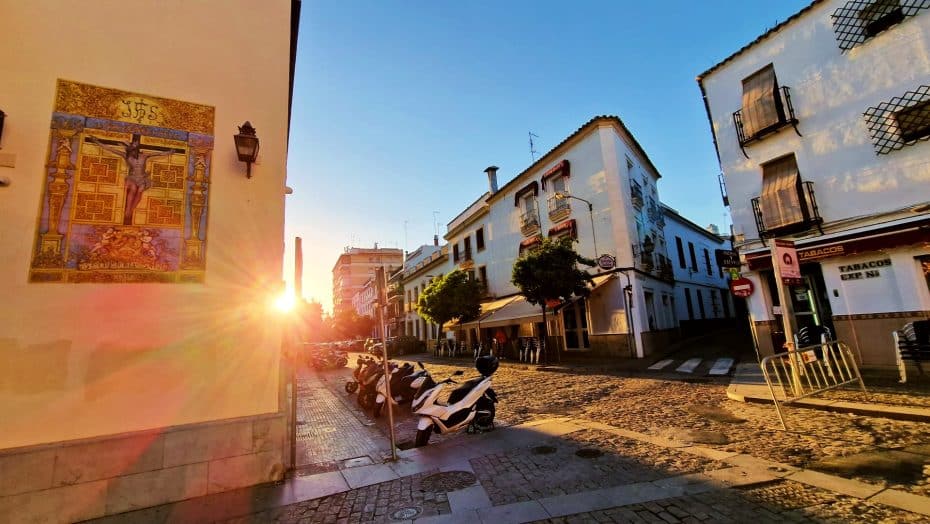
Is Córdoba Worth Visiting?
While it is true that most visitors overlook it as a tourist destination in favour of Granada or Seville, Córdoba is one of the most fascinating cities in Andalusia. From its unique Fair of the Courtyards to the imposing Mosque-Cathedral, this city’s cultural and historical offer is well worth a visit of at least two days to begin discovering its secrets.
In addition to the aforementioned Mosque, some of the unmissable attractions in Córdoba include the Jewish Quarter and its Sephardic Museum, the Roman Bridge, the Alcázar de Los Reyes Católicos and the fantastic and evocative streets of the city centre, such as Plaza de la Corredera, Cuesta del Bailío or Boulevard del Gran Capitán.
The main Córdoba attractions speak of a glorious past marked by its two-millennia history. The Romans founded the city in 169 C.E. In the Middle Ages, Córdoba was the largest city in the world and Europe’s educational and cultural epicentre. Currently, the city holds the world record for UNESCO World Heritage Sites.
In this article, we will talk about the top things to see in Córdoba for a short visit. We will include the attractions in the historic centre and the archaeological site of Medina Azahara, a fortified palace city on the outskirts of the city.
Top Attractions in Córdoba, Spain
This is a list of the essential activities and must-see attractions in Córdoba, so you don’t miss anything in this Andalusian city.
1. Mezquita-Catedral de Córdoba: The Most Visited Attraction in the City
The Mosque-Cathedral of Córdoba (sometimes also called Mezquita de Córdoba) is the city’s most iconic monument and, without a doubt, the most impressive.
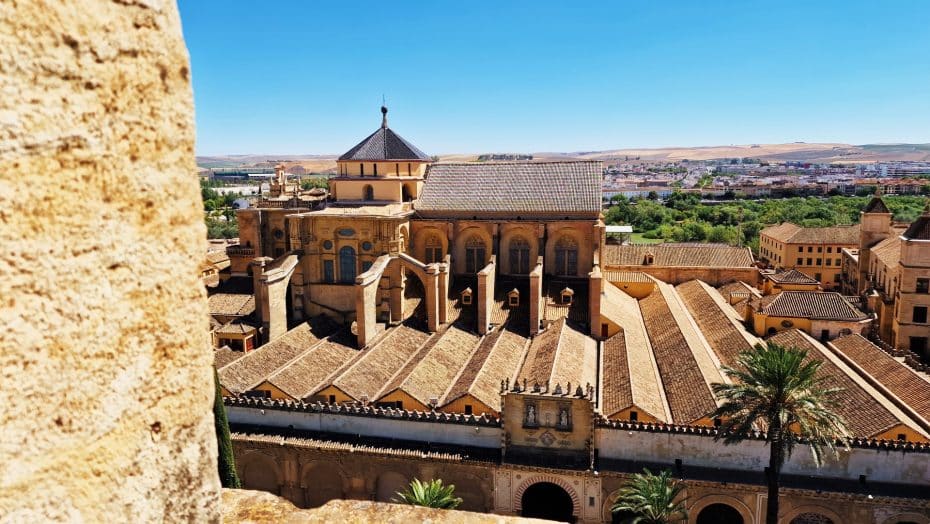
Built in the year 785 on the ruins of the Basilica of San Vicente Mártir by Muslim emir Abd al-Rahman I, the Mosque of Córdoba has been enlarged and embellished over several centuries.
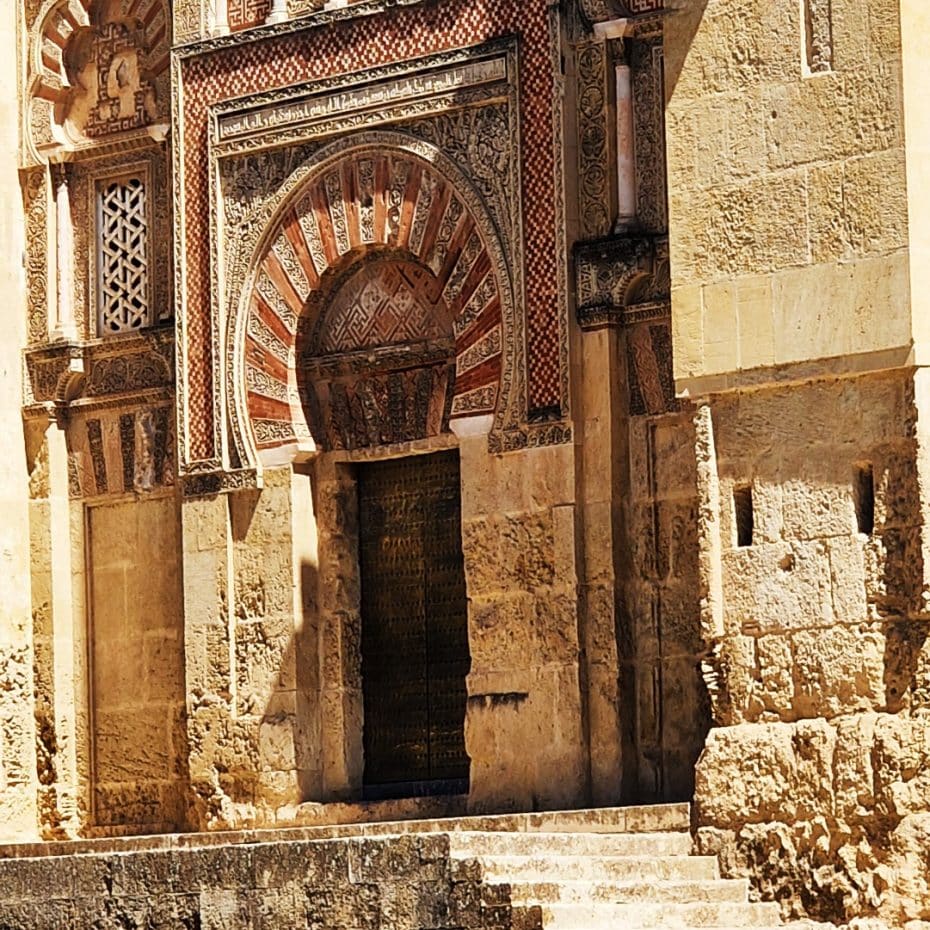
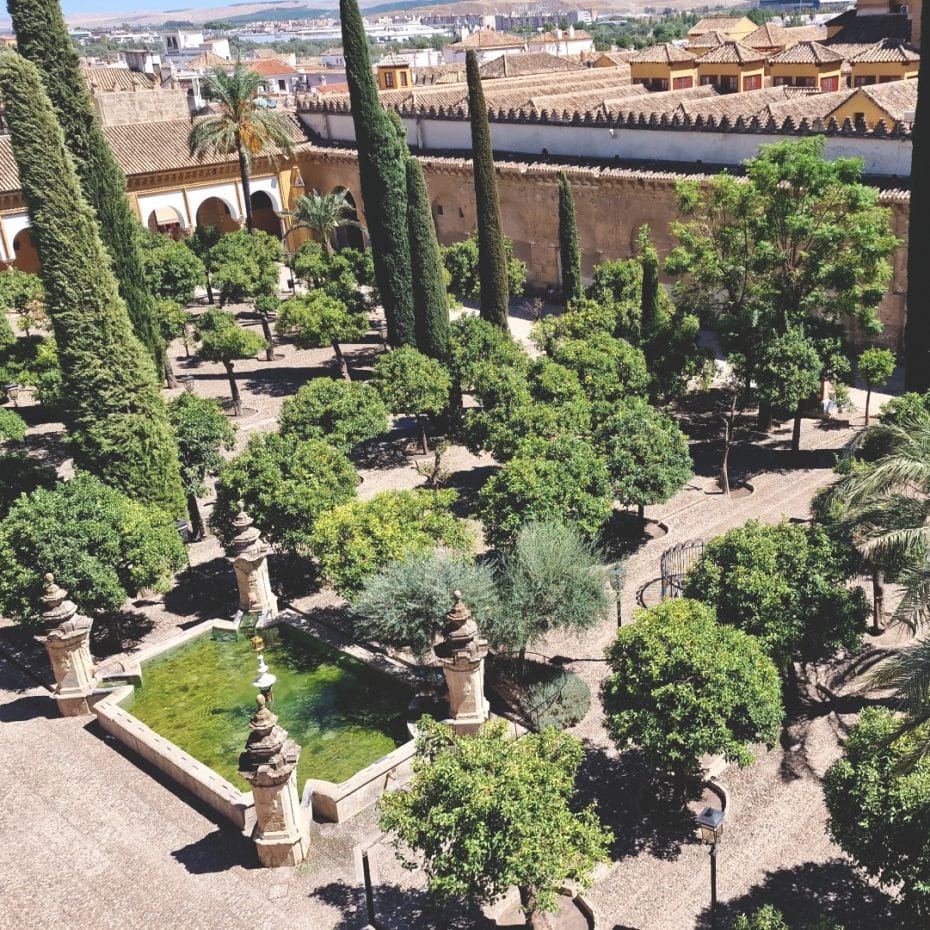
Today, it is considered one of Spain’s most beautiful examples of Islamic art.
After the Christian Reconquest, the city’s cathedral was erected, preserving the mosque’s structure and creating a unique architectural mix. Inside, you can admire its “forest of columns” and endless red and white arcades enhanced by splendid lighting.
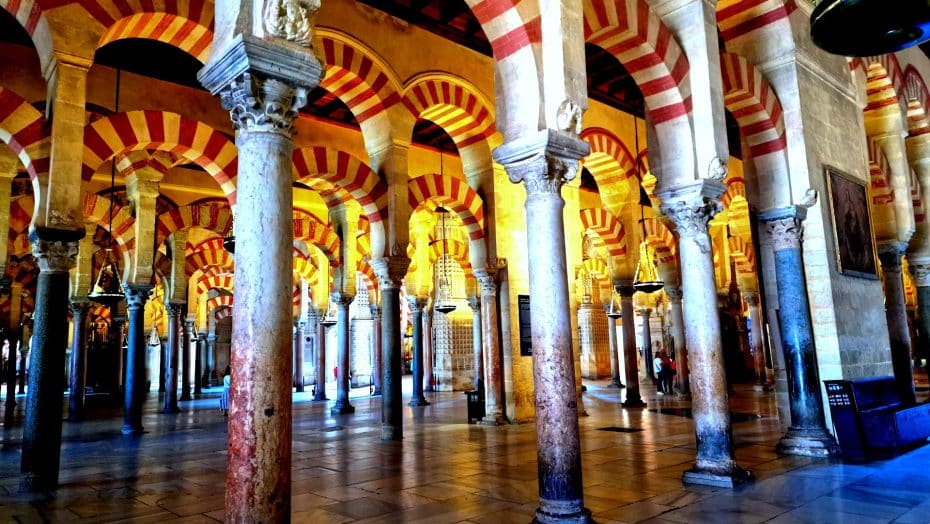
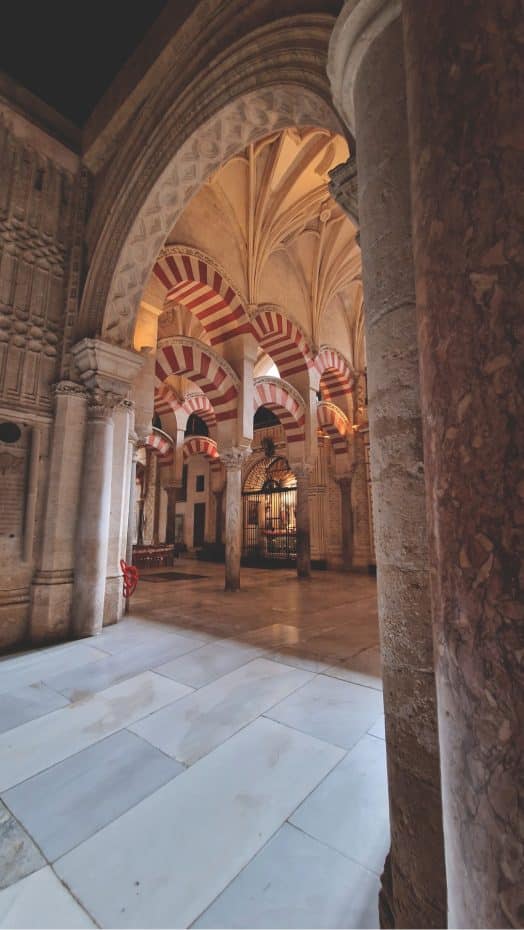
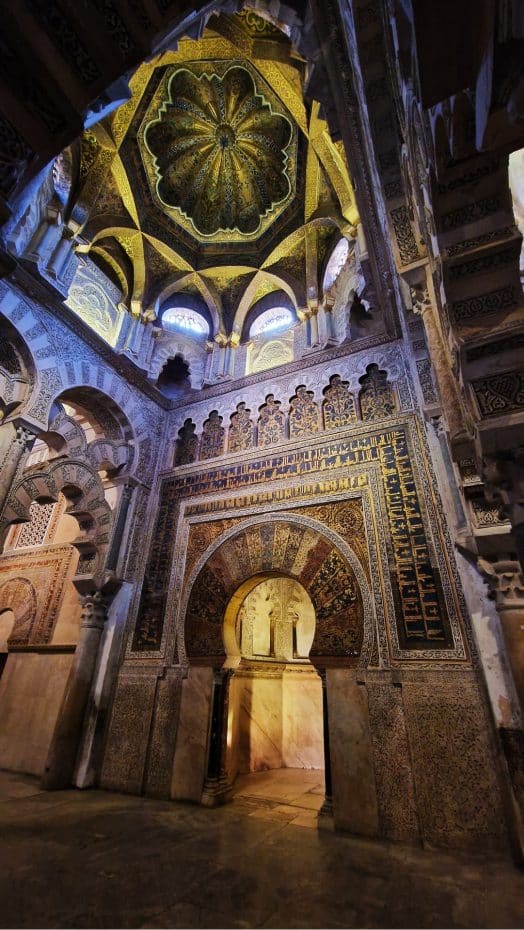
Spending an hour or two photographing the columns from all angles is a photographer’s dream.
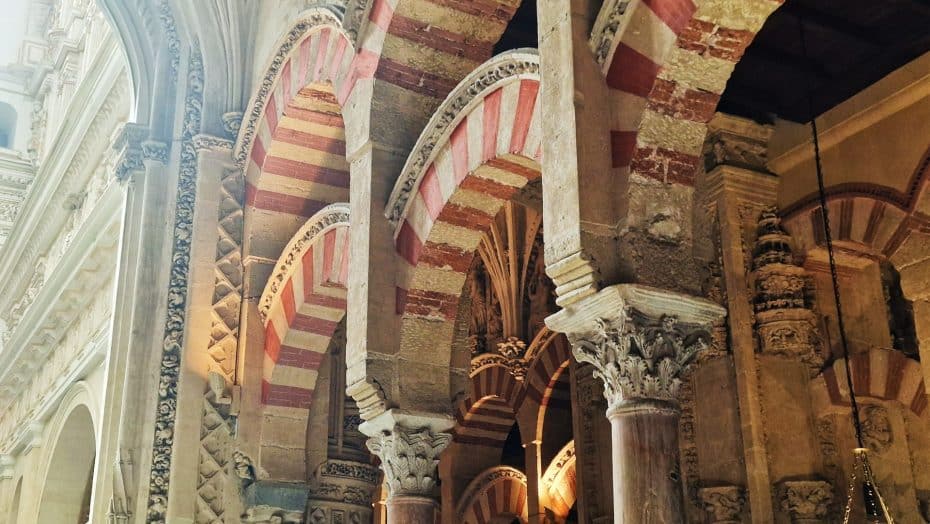
Tips for Your Visit
- You can buy tickets in the vending machines to avoid long queues. You will find them right next to the ticket office.
- If you know the exact date of your trip to Córdoba, you can buy your tickets here. You can buy just the ticket or include a guided tour.
- The best time to visit the mosque is at noon, around 12:45, as you will find much fewer people, and you will be able to take great pictures of the arcades without anyone around.
- It is also possible to climb the minaret for €3 (more information below).
- To save time and money, if you plan to visit the three main monuments of Córdoba (the Mosque-Cathedral, the Alcázar and the Synagogue) in a single day, the best thing to do is book a guided tour of all three places.
2. Bell Tower of the Mosque-Cathedral
Although the bell tower is part of the cathedral, we have broken it down as a separate attraction since its entrance ticket is purchased separately and is not included in the ticket for the Mosque of Córdoba.
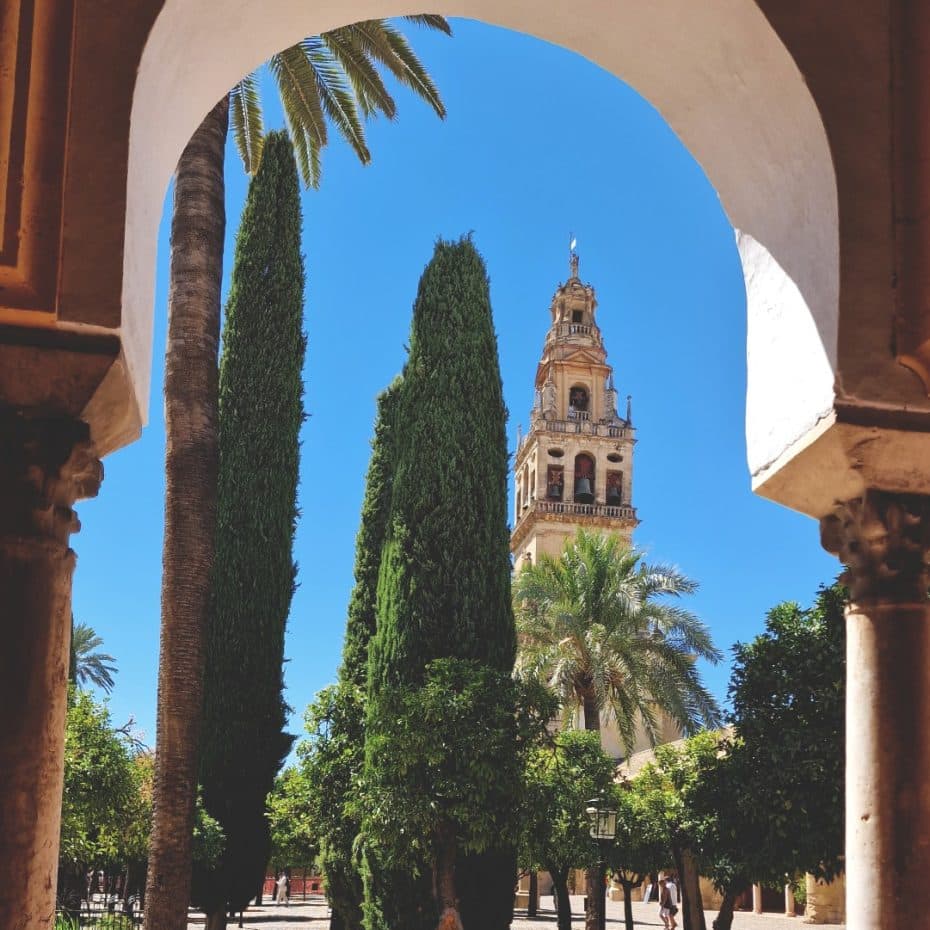
From the original Islamic minaret to the contemporary bell tower, this structure has played an essential role in Córdoba’s image and skyline. Although it has always had the same central function of summoning the faithful, its shape and style have evolved over time.
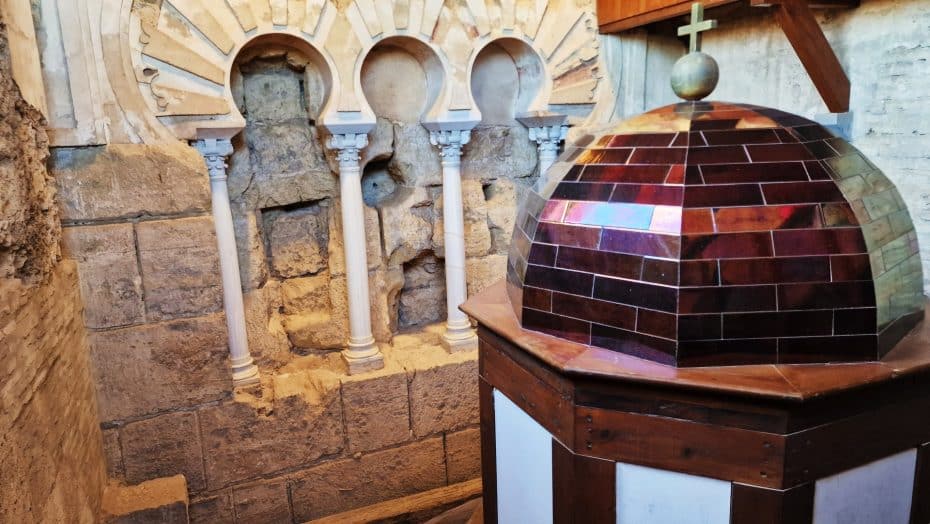
The original minaret was built by Abd al-Rahman III in the mid-10th century. After the Reconquista, the minaret was partially demolished, and a Renaissance bell tower with a square plan was built in its place.
With a height of 54 metres, the bell tower is the tallest building in the city. From its panoramic viewpoints, you can catch splendid views of the city of Córdoba, particularly the historic centre.
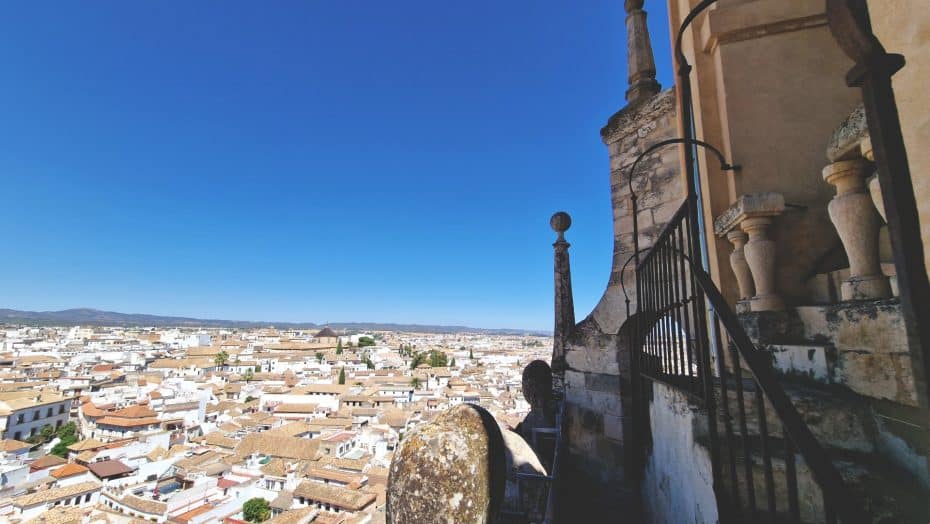
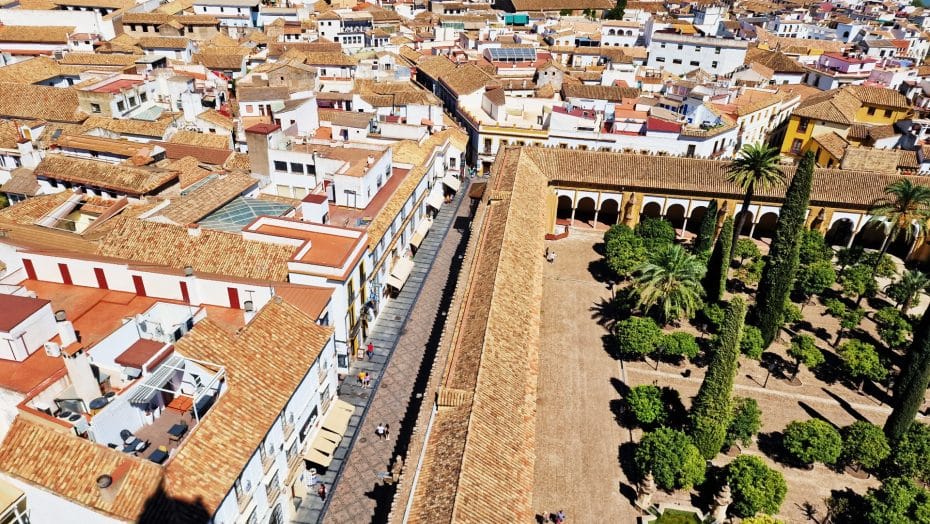
Admission to the bell tower is 3€. They allow visitors every half hour from 9:30 a.m. to 1:30 p.m. and from 4:00 p.m. to 6:30 p.m. Tickets are purchased at the automatic ticket kiosk near the entrance.
3. Alcázar de Los Reyes Cristianos
The Alcázar de Los Reyes Cristianos is a splendid palatial complex built in 1327 by Alfonso XI.
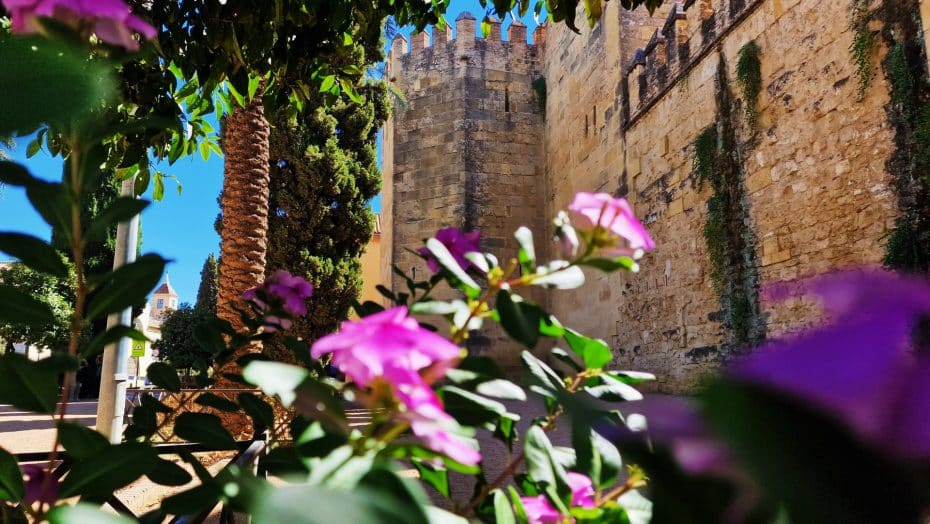
This fortress was, for about eight years, the residence of the Catholic Monarchs. It was also the Holy Office’s seat during the Inquisition’s time. Later, it became a prison. It wasn’t until the middle of the 20th century that the authorities declared the complex a Site of Cultural Interest.
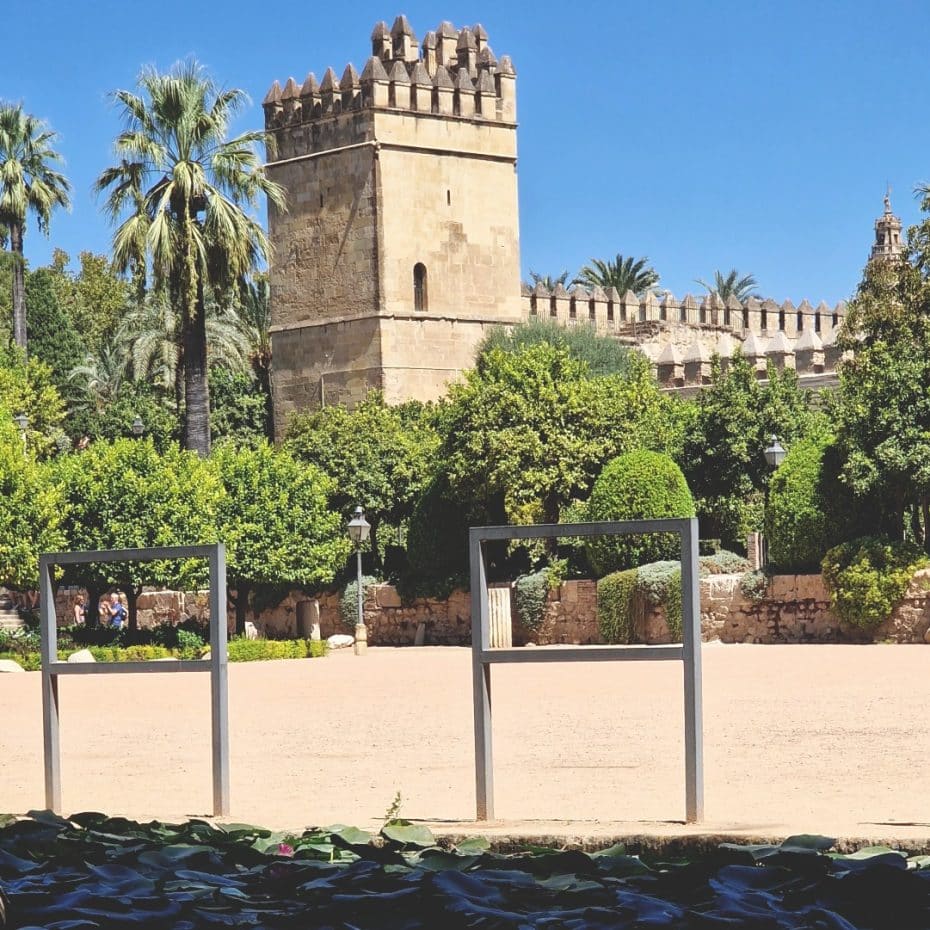
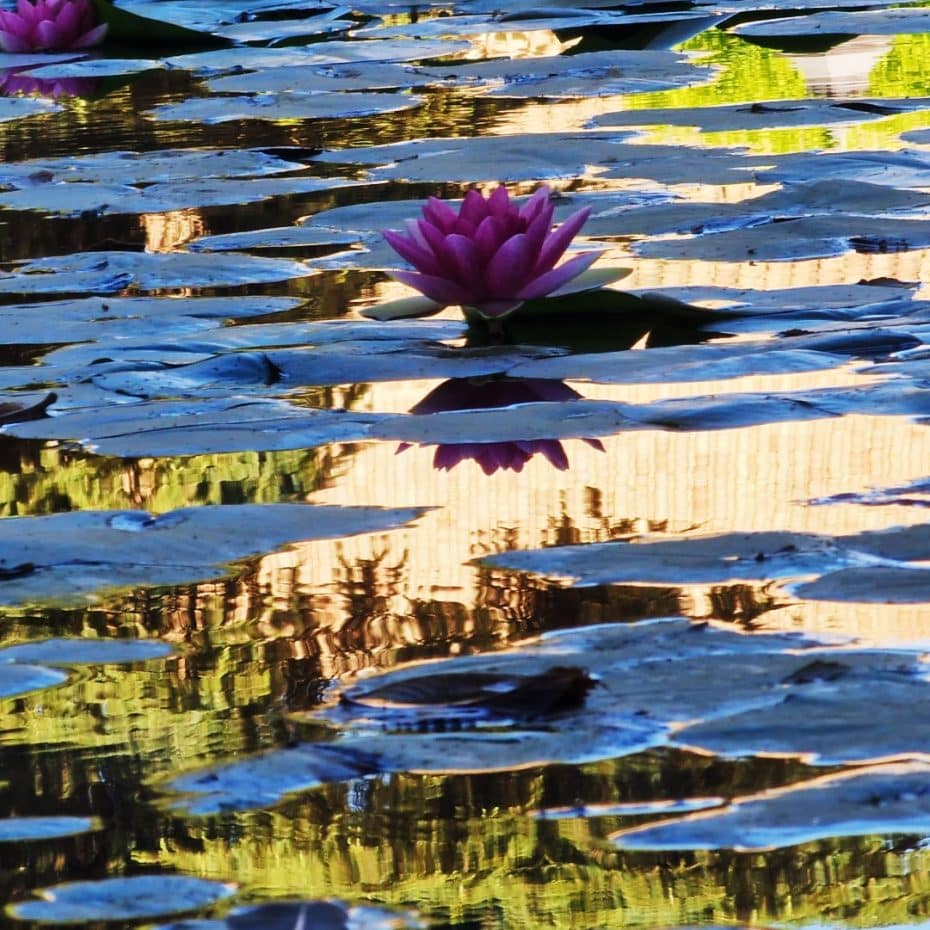
You can start by visiting one of the four towers of the Alcázar (“Los Leones”, “Del Homenaje”, “La Inquisición”, and “Las Palomas”). You will reach the walls, and from there, you will be able to enjoy a unique panorama of the city.
Some highlights inside the Alcázar of Córdoba include the Mosaic Hall, the Royal Baths and the Moorish Patio.
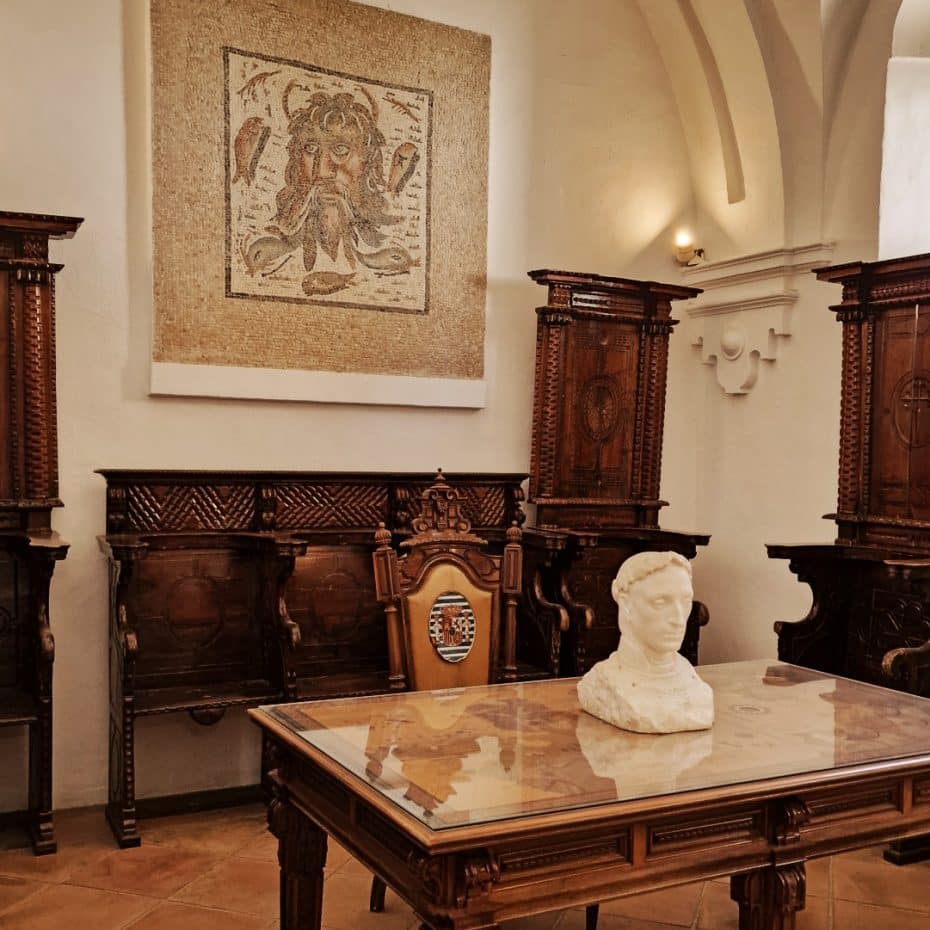
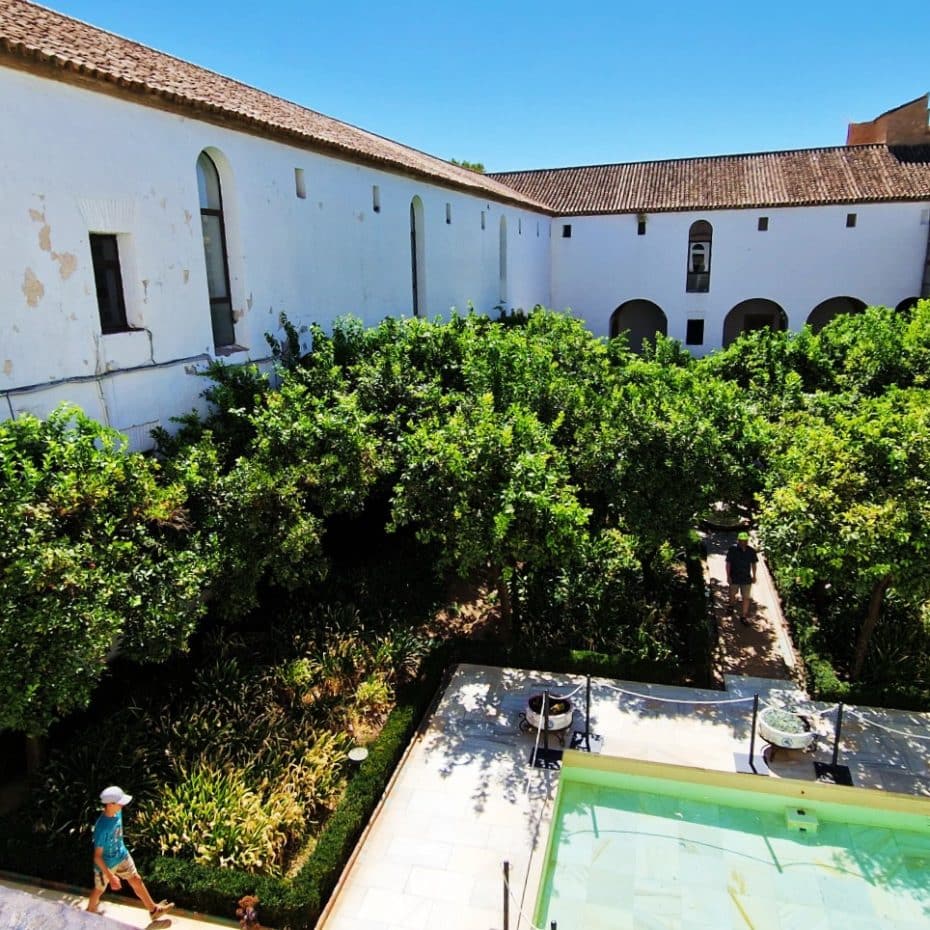
That said, the best part of the visit lies outside of the main buildings. Its beautiful gardens consist of picturesque paths lined with orange trees and flowers and decorated with beautiful fountains and ponds.
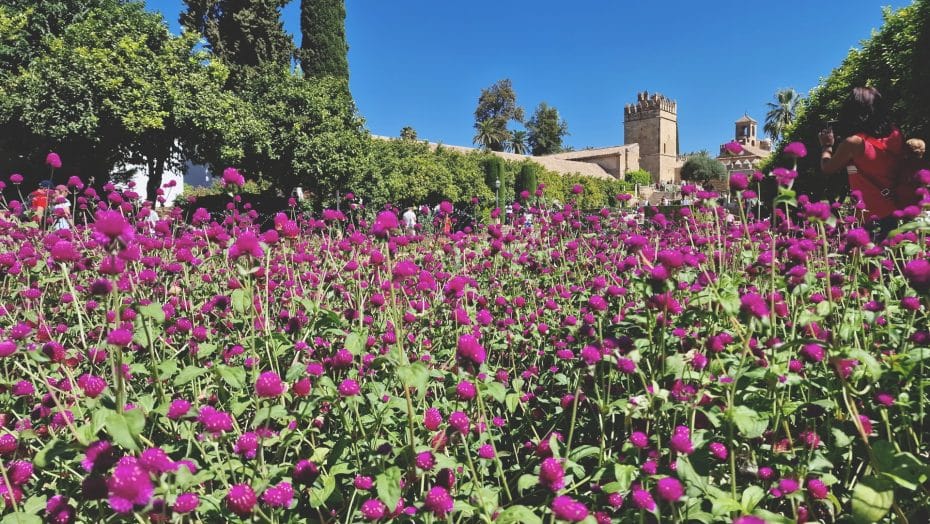
4. Córdoba Synagogue
Córdoba Synagogue was built at the entrance to the Jewish quarter around the 14th century and is the only surviving Talmudic temple in Andalusia. After the expulsion of the Jews in 1492, it became a church.
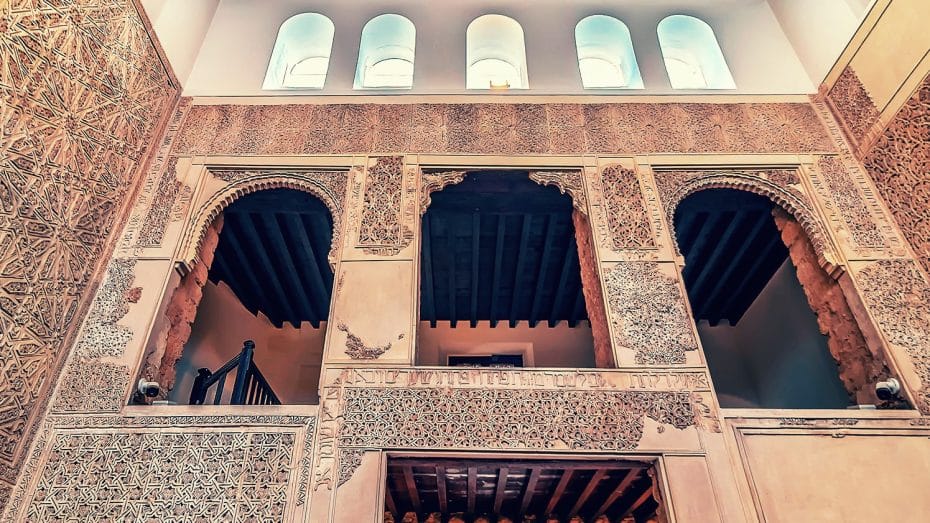
The grandeur of this Synagogue can be seen in the beautiful Mudejar-style decoration, which has Christian characteristics combined with elements of Arab inspiration found only in some areas of the Iberian Peninsula.
The simplicity of its façade contrasts with the delicate ornamentation of the prayer room. It has a square floor plan and a high ceiling, almost entirely decorated with a complex network of reliefs that represent geometric motifs, floral elements and writings in Hebrew.
5. La Judería: Córdoba’s Jewish Quarter
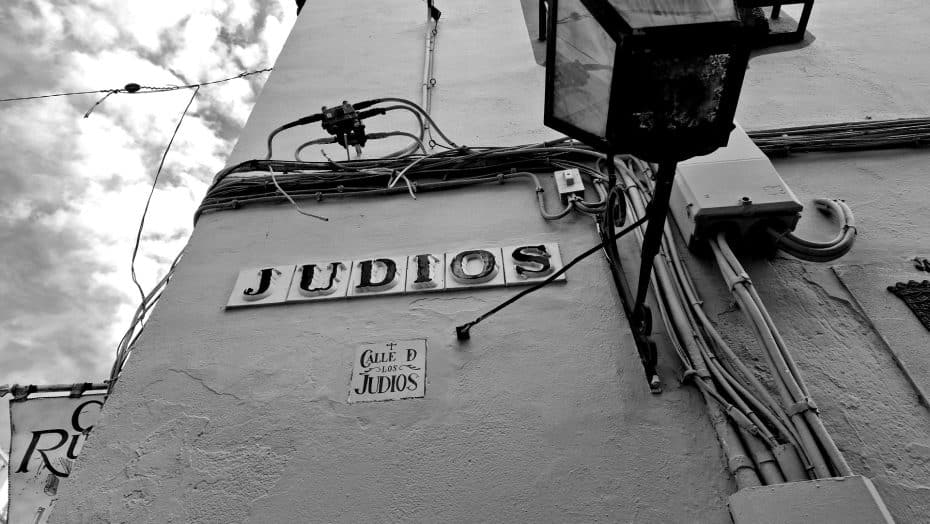
It is perhaps the most famous Jewish quarter in Andalusia and one of Europe’s most important Jewish quarters. Its narrow cobbled streets crisscross the city between jumbled white walls and the defensive wall from the Arab period.
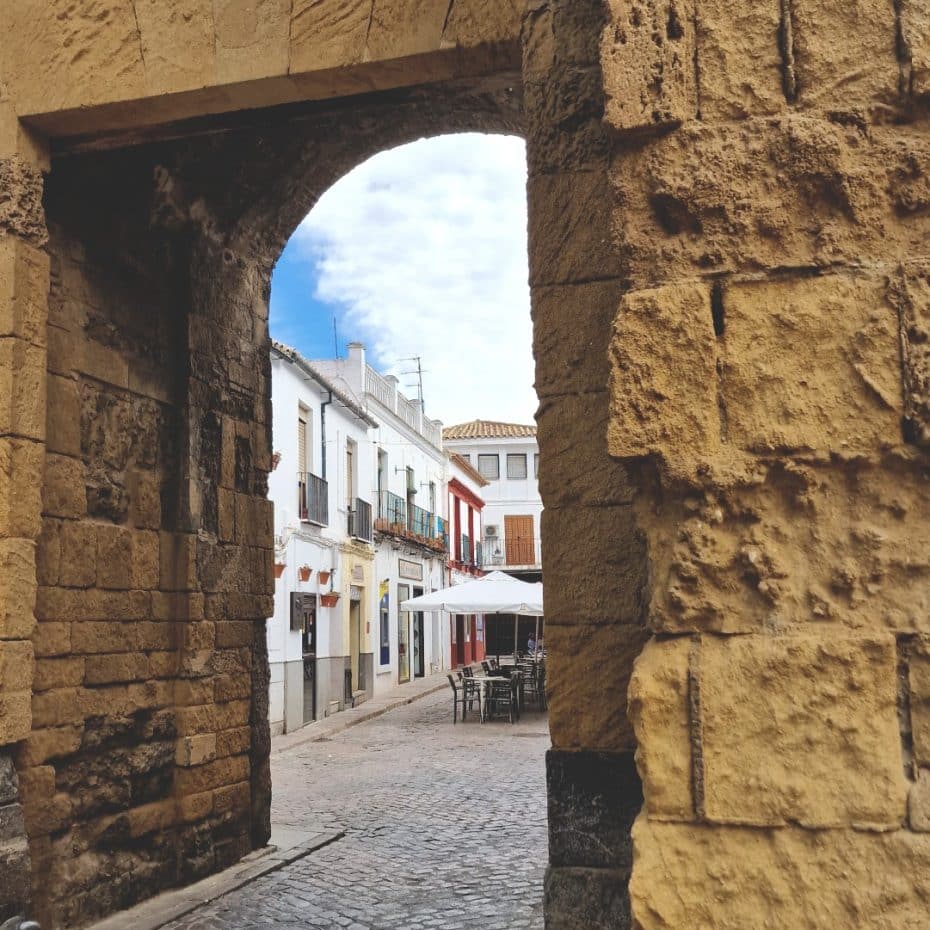
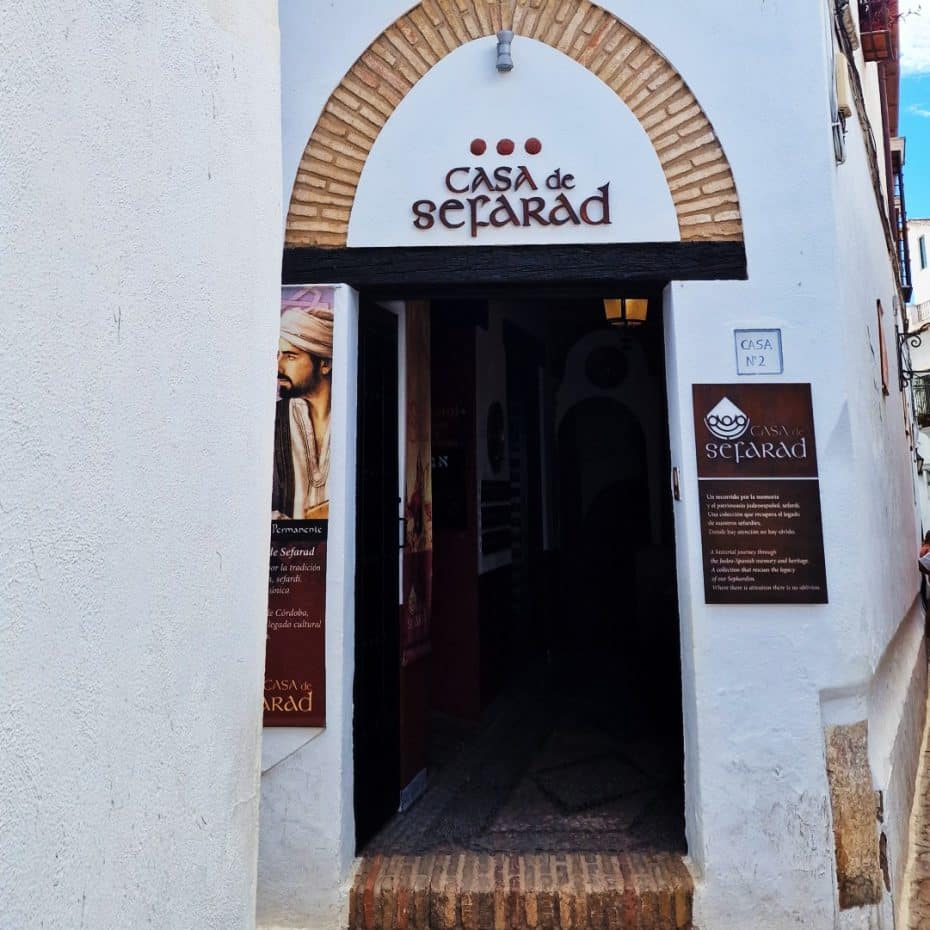
This area is home to the Synagogue, several museums and traditional houses and patios.
The streets, lined with beautiful palaces and small squares, offer tourists the pure essence of this Spanish city.
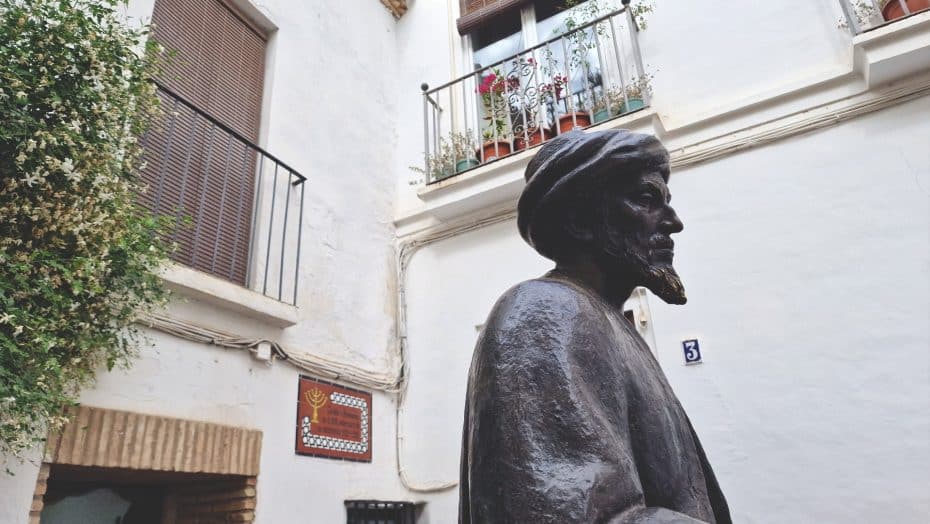
Among the narrow streets is the statue of Maimonides, a very important Jewish figure who dedicated his life to philosophy, science and medicine and exerted a decisive influence on the Eastern and Western worlds.
Travel Tip
The Córdoba’s Jewish Quarter is one of the stars of the several tours covering the city’s historic centre. Although you can visit it on your own, the experience and knowledge of an expert guide will help you better understand the importance of the Jewish community in the city. These are some of the best-rated guided tours of La Judería:
6. Puerta del Puente
Puerta del Puente is one of the only three monumental gates currently in existence in Córdoba.
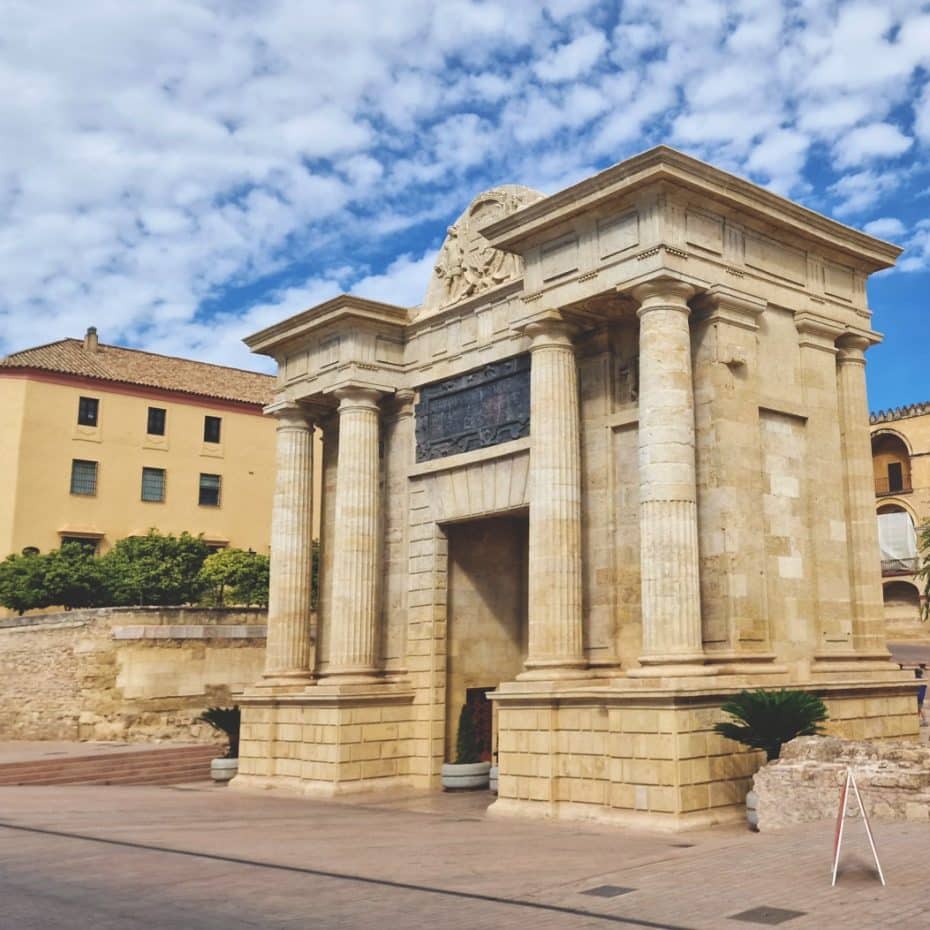
Puerta del Puente, which dates from 1572, was built on a previous Muslim-era gate and, presumably, an older Roman one.
Although it has lost its defensive function today, Puerta del Puente is still the most imposing access point to the UNESCO-protected Monumental Córdoba area.
7. Puente Romano: Córdoba’s Roman Bridge
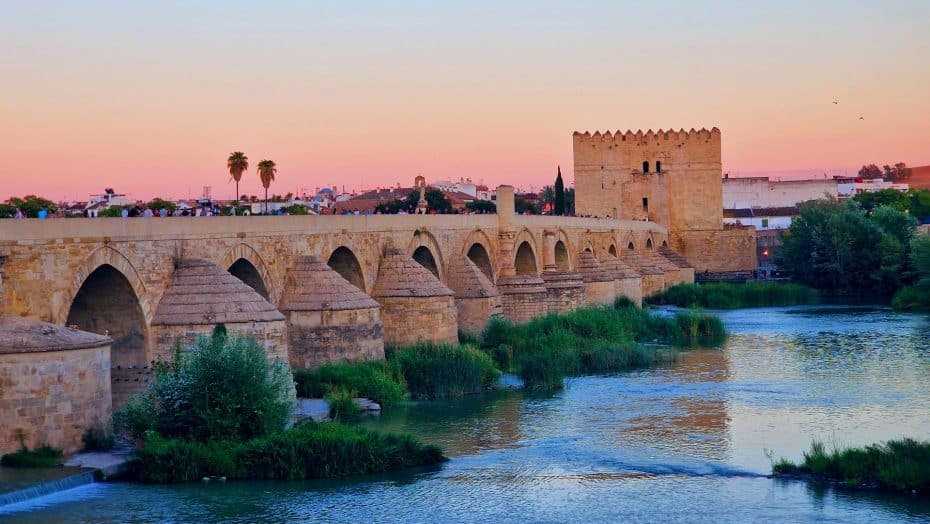
The Puente Romano is one of Córdoba’s must-see attractions. This bridge is one of the most photographed monuments in this Andalusian city, especially at sunset.
The panoramic of the bridge over the Guadalquivir and the view of the mosque-cathedral are among the city’s most beautiful views.
Built in the 1st century BC, it was the main access to Córdoba and the city’s only bridge over the Guadalquivir for almost two thousand years.
On the other side of the bridge lies the imposing Calahorra Tower.
8. Torre de Calahorra
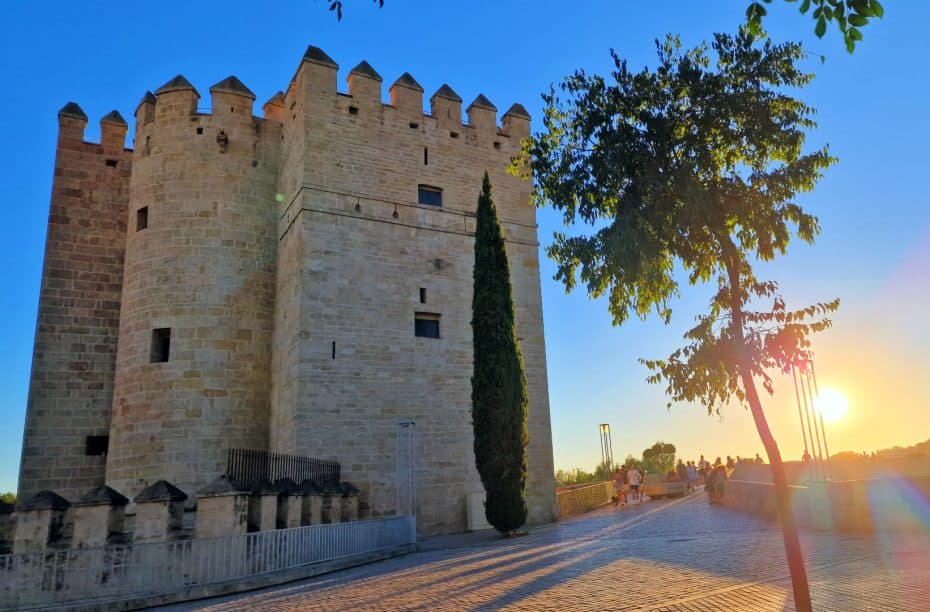
Calahorra Tower protected the entrance to the Roman Bridge, the main access to the city of Córdoba in medieval times.
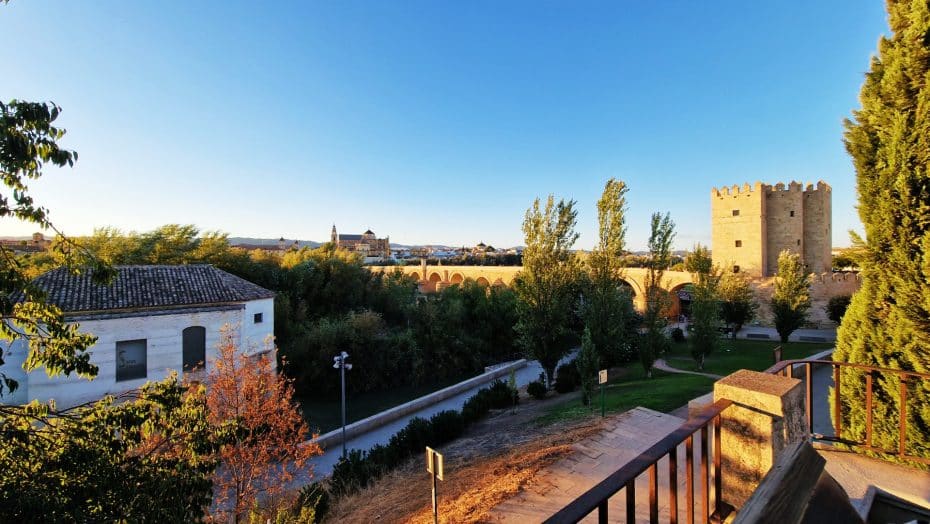
The current structure is a Christian fortress built in the 14th century on a previous Moorish bastion.
Declared a National Historical Monument after being used as a school and prison. The tower currently houses an exhibition on the culture of the kingdom of al-Andalus. Its panoramic terrace offers one of the most beautiful views of the city.
9. San Bartolomé Chapel
The Ermita de San Bartolomé is situated very close to the Synagogue of Córdoba.
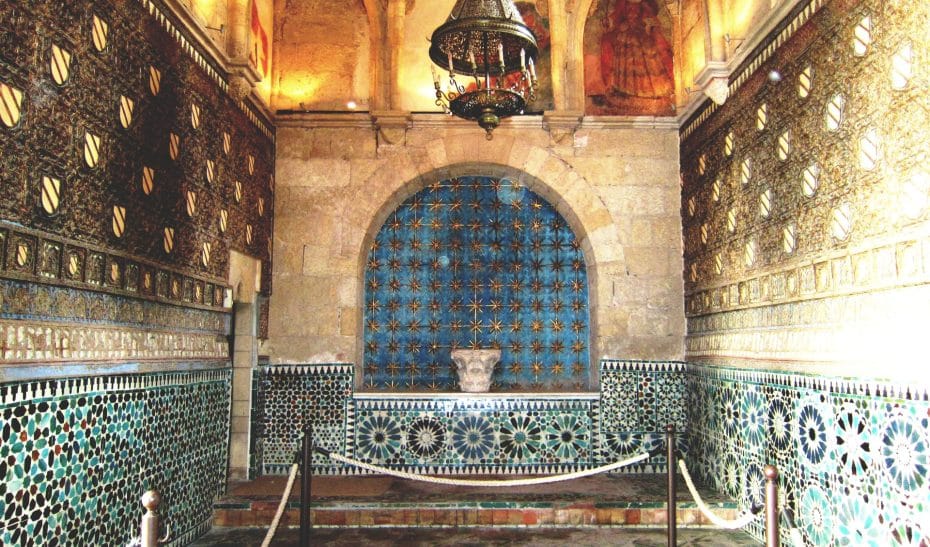
This small chapel is one of the best examples of Mudejar art and architecture in Córdoba. It was built in the 14th century. It has a one-nave plan with a ribbed vault, and a lovely decorated with terracotta tiles.
10. Viana Palace
Famous for its 12 courtyards, Palacio de Viana started as a small stately house that gradually expanded, incorporating the surrounding properties and becoming a spectacular and unique architectural monument in Córdoba.
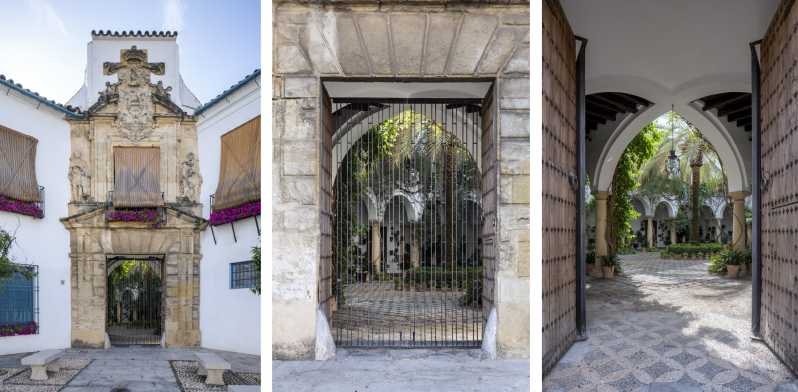
The main attractions in the palace’s 6,500 square meters are its many patios, gardens, plants and fountains. Following the Arab and Roman tradition, fountains are not just a decorative element; they also help cool the environment during Córdoba’s scorching summers.
Another highlight of the palace is its decoration, which includes tapestries, paintings (including a Goya ), period furniture, and a library with 7,000 copies.
11. Caballerizas Reales (Royal Stables)
The Caballerizas Reales are a set of stables built in 1570 by the order of Phillip II.
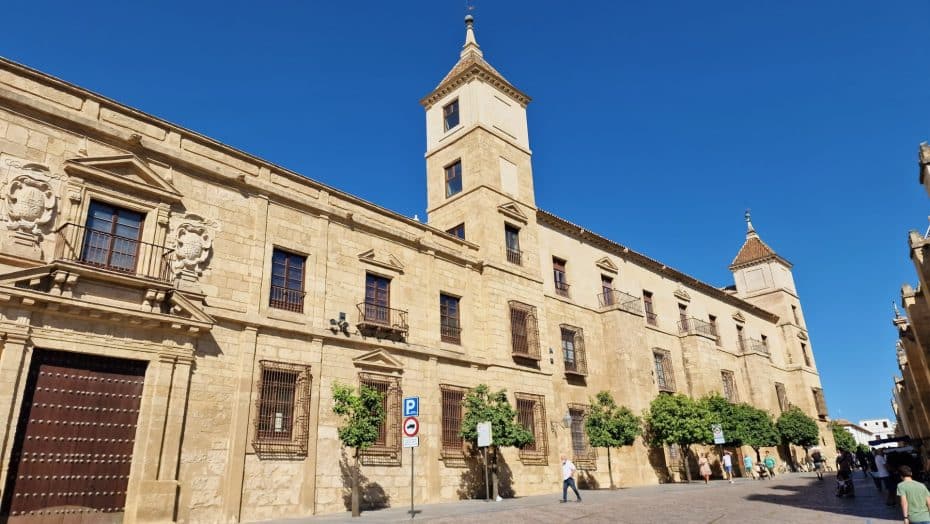
A great lover of horses, the monarch gathered the best stallions and mares of the Guadalquivir Valley, giving rise to the majestic and highly appreciated Andalusian Horse breed.
Today, you can still see horse shows and an exhibition of old carriages, and walking among the stables and the beautiful horses is possible and free of charge.
12. Plaza de la Corredera
The Plaza de la Corredera is a unique example of a Castilian square in Andalusia. It was built in the style of Madrid’s Plaza Mayor.
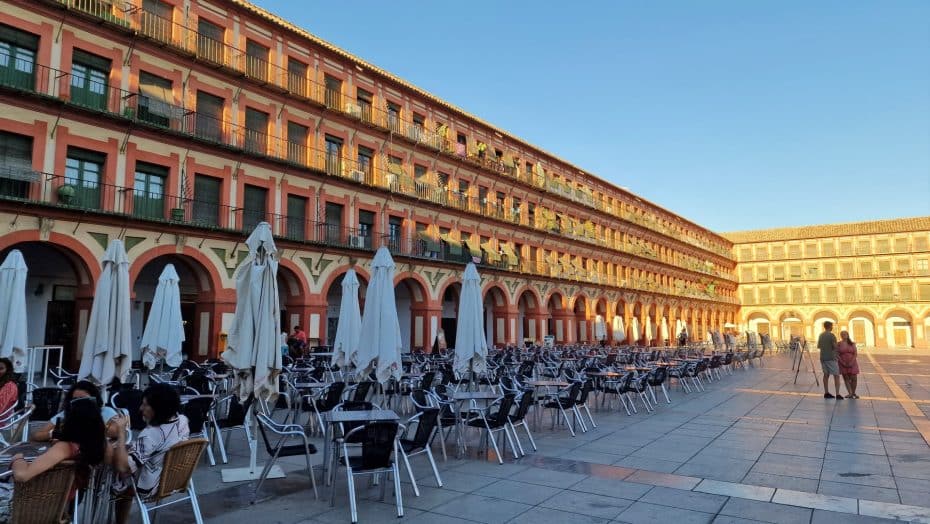
An interesting fact about this square is that it was built on the ruins of an ancient Roman amphitheatre. Many Roman mosaics were found during the excavations, most of which can still be seen today at the Alcázar.
The square was the scene of the city’s bullfights (corridas), hence its name, and is currently home to numerous restaurants, bars and nightclubs, so it is a very lively area at night.
13. Victoria Market
Victoria is the first gastro-market opened in Andalusia.
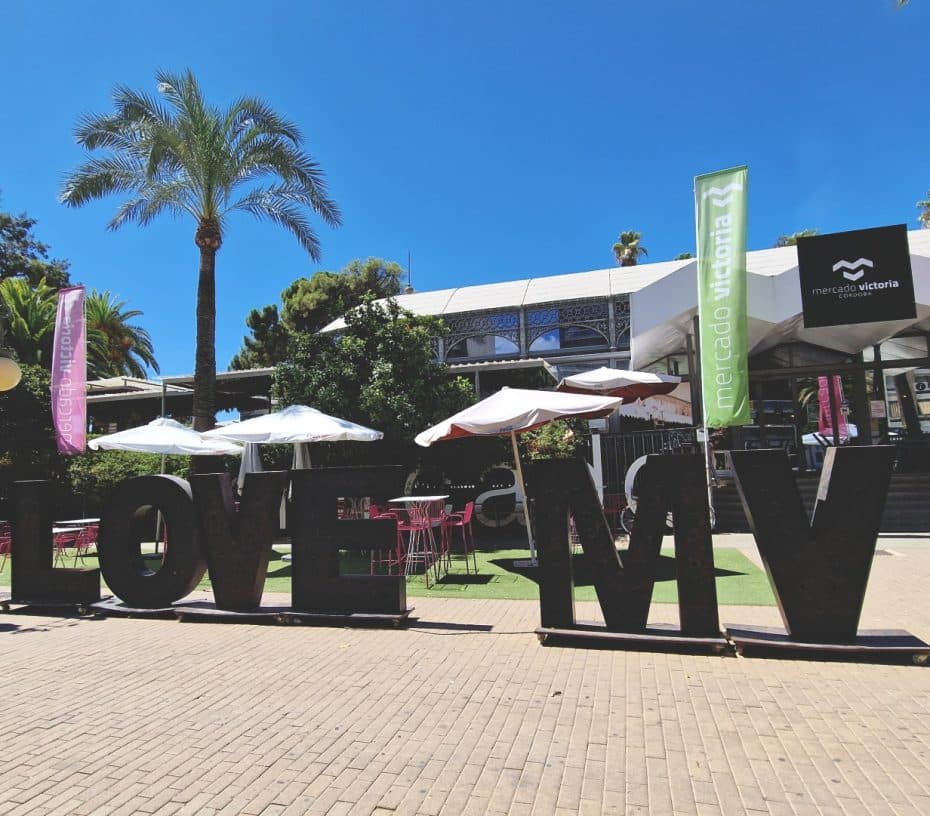
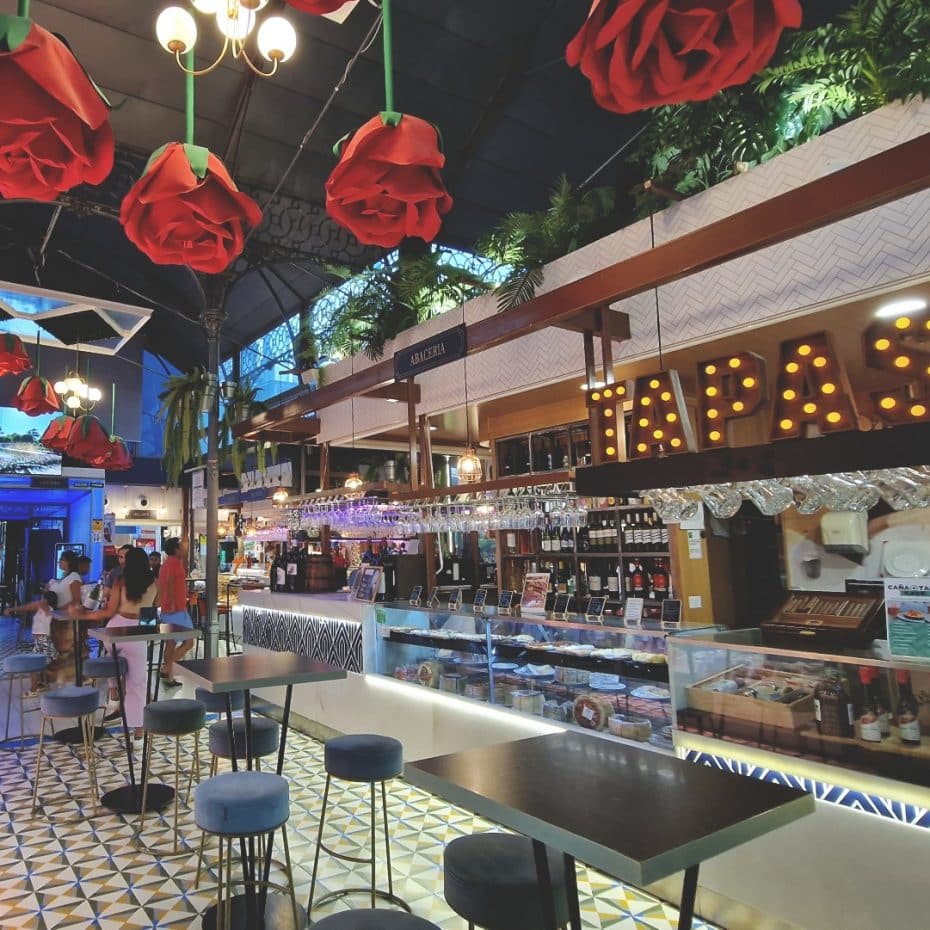
It is located in Jardines de la Victoria in a wrought-iron structure from the late 19th century. It used to be a fair pavilion during the city’s Feria de Abril until 1994.
14. Plaza de las Tendillas
Plaza de las Tendillas is a lovely square in Cordoba’s City Centre. Its water jets and fountain make it even more pleasant during the hot summer season in Andalusia.
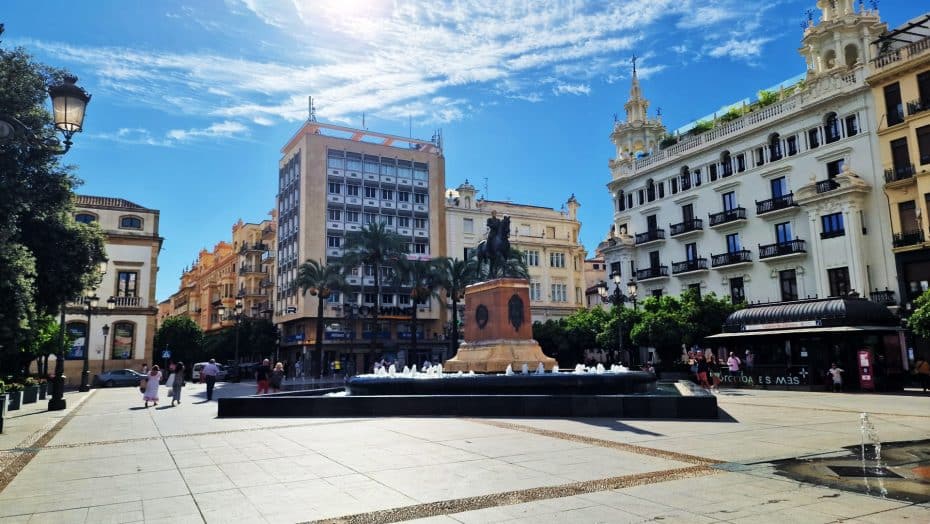
It gets its name from the small tents that used to house the Order of Calatrava since the 14th century, and it is the place for the people of Cordoba to celebrate New Year’s Eve.
Many cafes, bars and restaurants with terraces border the square.
The square is also known for the magnificent architecture of the elegant buildings around it.
15. Jardines & Convento de la Merced
The Jardines de la Merced are a small public park north of the historic centre of Córdoba.
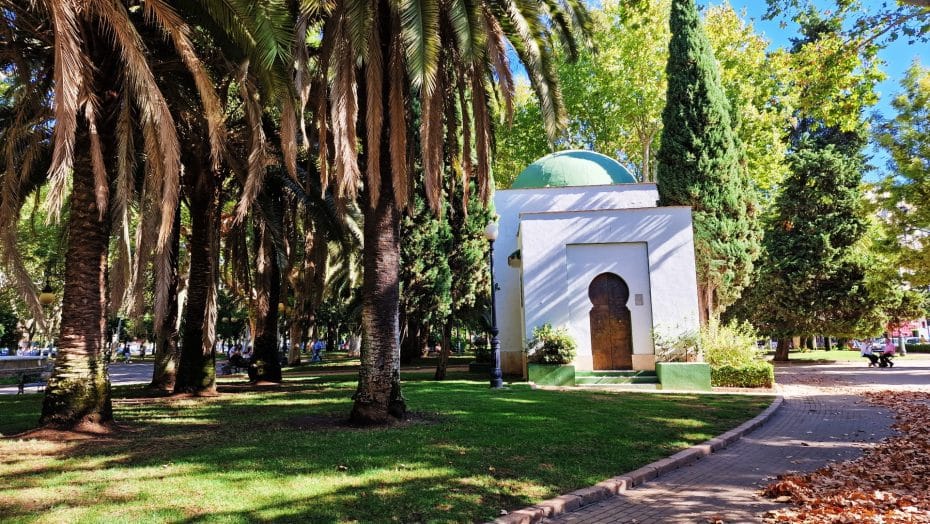
These gardens are decorated with a romantic-style fountain in their centre. Designed at the end of the 19th century by Rafael del Rosal, this urban park has a large number of rose bushes, palms and other trees and is home to the small Morabito Mosque.
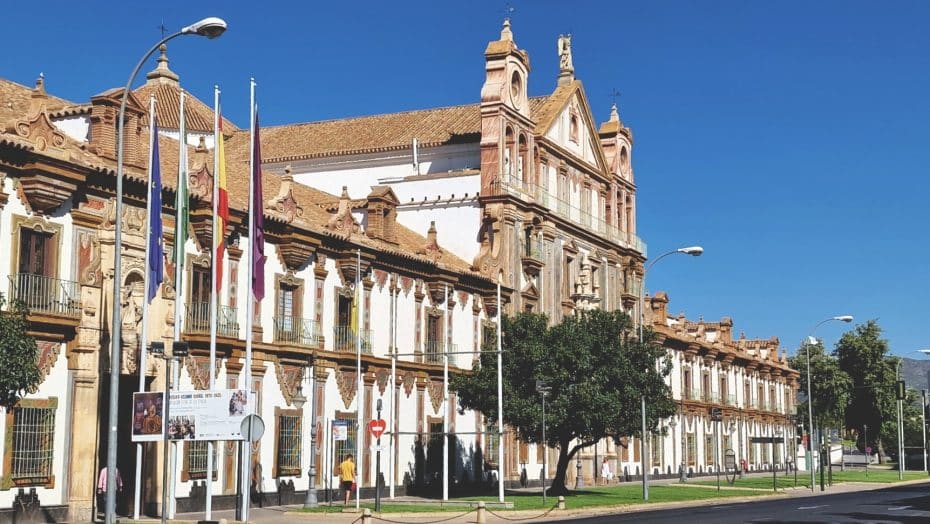
The gardens also offer a beautiful view of the baroque monastery of La Merced, currently the seat of the Córdoba council.
16. Patios of Córdoba
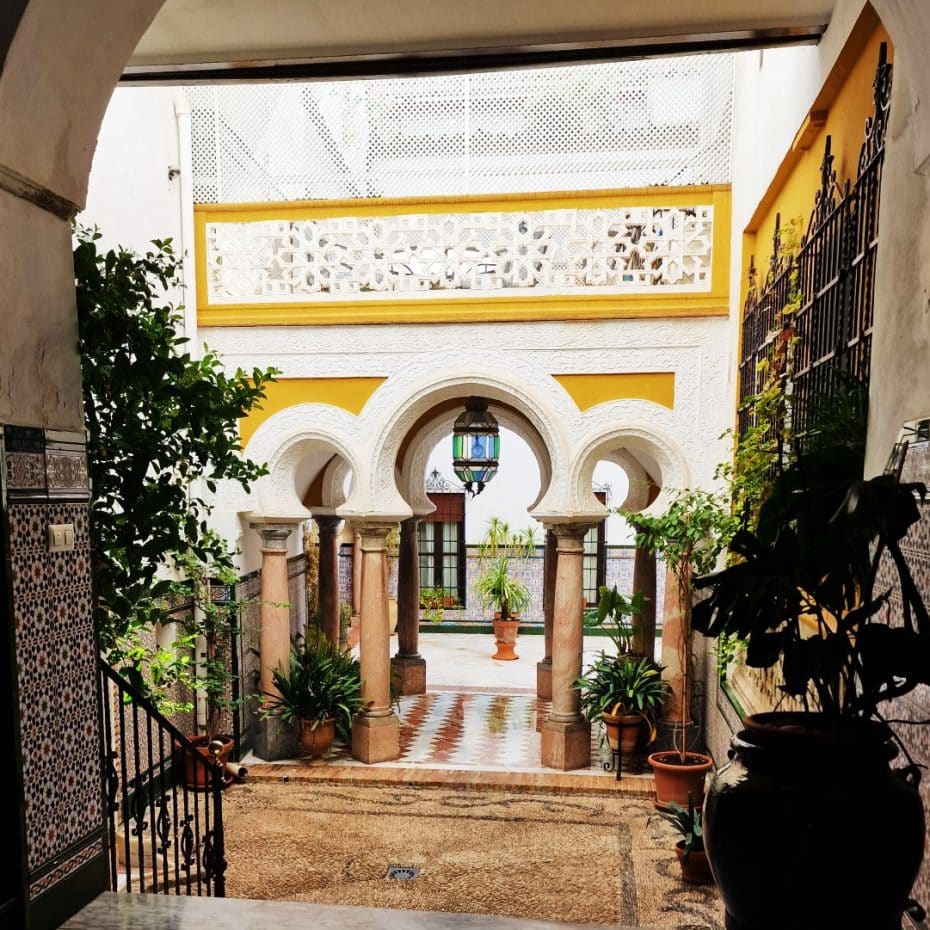
Córdoba is known for being home to some of the world’s most beautiful alleys and patios.
It is no coincidence that the city hosts the Cordoba Patios Festival every year. The event has taken place during the first fortnight of May since 1921. Of course, visiting Córdoba during the festival is not necessary to admire its wonderful patios.
Travel Tips to Visit the Patios
- Tickets: Access to the courtyards of Córdoba is free (although a tip is usually left to help with their upkeep).
- How to get there: are located along Calle de San Basilio.
- Tours and activities: Several tours of the historic centre include visits to the courtyards. Some of the best-rated are:
17. Córdoba Roman Temple
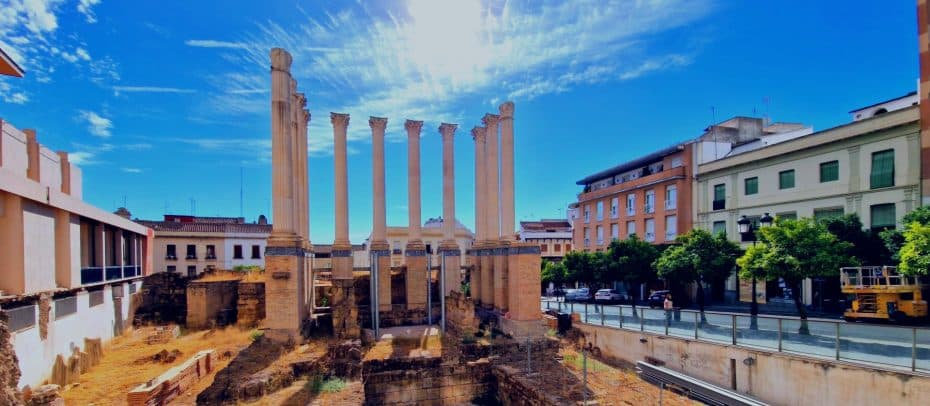
Located next to the Town Hall, the Roman Temple of Córdoba is absolutely massive. It is a pseudoperipteral temple (with columns only on the façade), hexastyle (with six columns), and of the Corinthian order (with the capitals decorated with acanthus leaves) and measures 32 by 16 metres and 9 meters high.
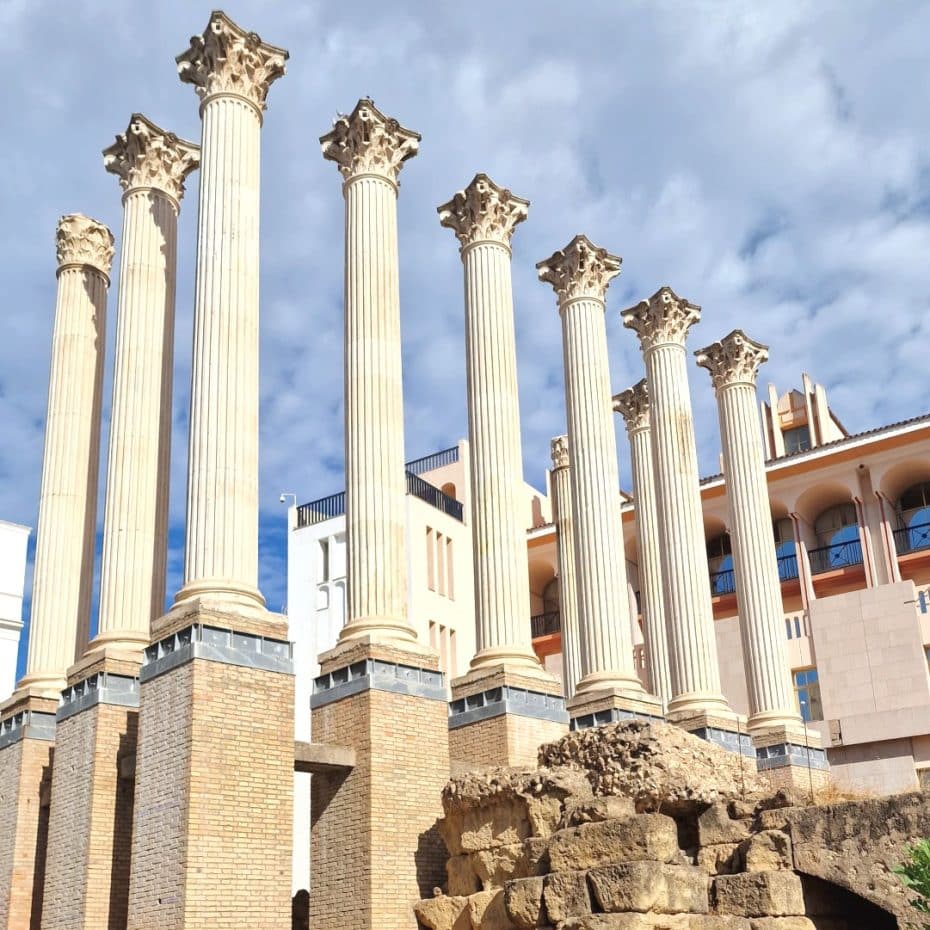
The Roman Temple of Córdoba was discovered in the 1950s and dates from the 1st century AD. Although we can’t know for sure, it is believed that it was dedicated to the Imperial Cult, that is, to deified emperors.
Fun Fact: The monument we see today is a 1950’s reconstruction of the temple’s six columns. The only original pieces are the foundations, the altar, the staircase and a few pieces of columns and capitals.
18. Plaza de Capuchinos & Cristo de los Faroles
The Christ of Reparations and Mercy statue, known as Christ of the Lanterns, is a sculpture by Juan Navarro León in Plaza de Capuchinos in Córdoba. Made in 1794, the statue is located in one of the most traditional places in the city, in a square that formerly belonged to a Capuchin monastery.
It gets its popular name from the eight lanterns that surround it.
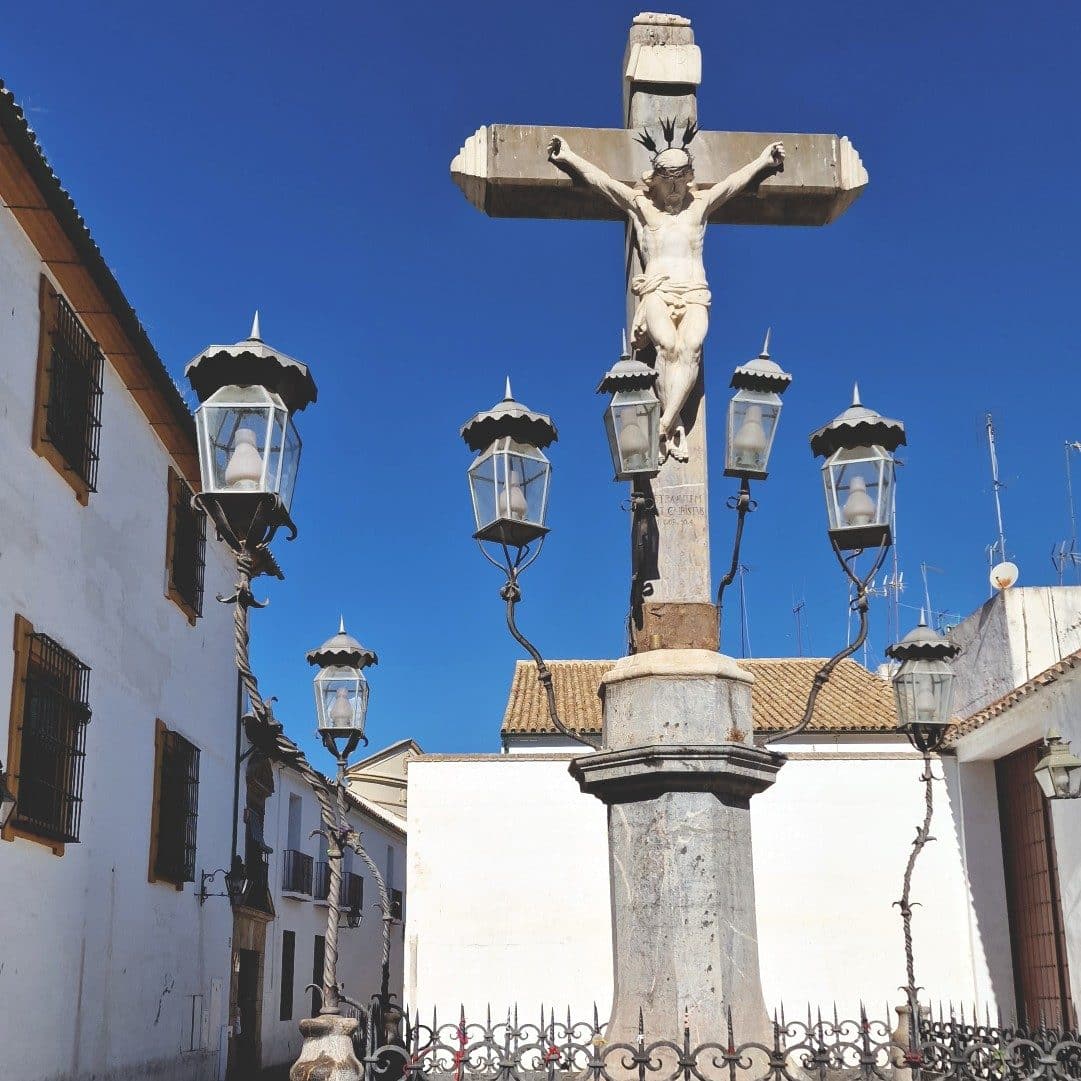
Famous for being in one of the epicentres of Easter celebrations in Cordoba, the statue has also been featured in many European films.
19. Monuments to the Patio Keepers
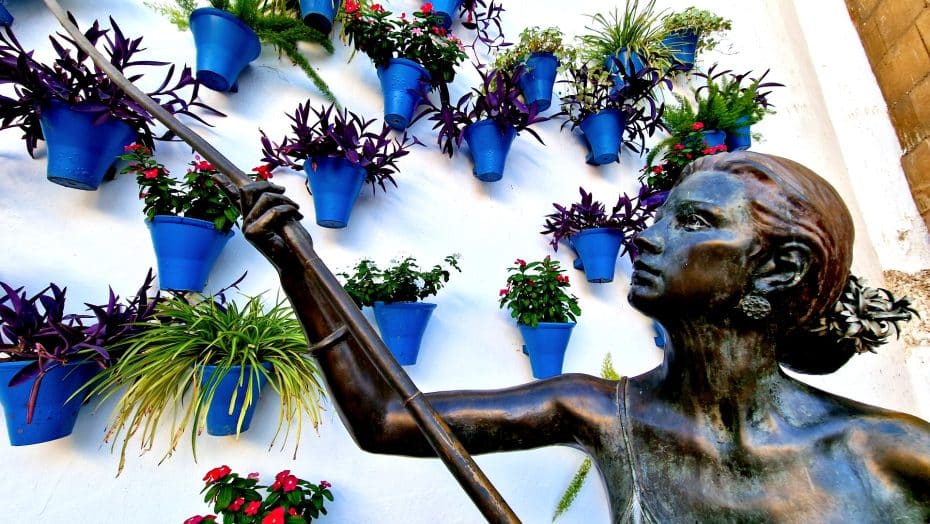
Wanting to honour the work of the Cordoba residents who take care of the city’s traditional patios, the Monumentos a Los Cuidadores de Los Patios were unveiled in 2014.
Created by José Manuel Belmonte, the group represents this tradition’s present, past and future through two separate ensembles. The first is next to the Puerta del Rincón and shows a woman watering pots. It represents the present.
A few months later, a second group was unveiled in Alcázar Viejo. It represents an older man (the past) giving a watering pot to a child (the future) so that he can continue the tradition.
These sculptures celebrate the work of all those who have helped the Fiesta of the Patios be declared an Intangible Cultural Heritage Tradition by UNESCO in December 2012.
20. Plaza del Potro
Plaza del Potro is a small rectangular 14th-century square located in the centre of Córdoba, close to the Guadalquivir river.
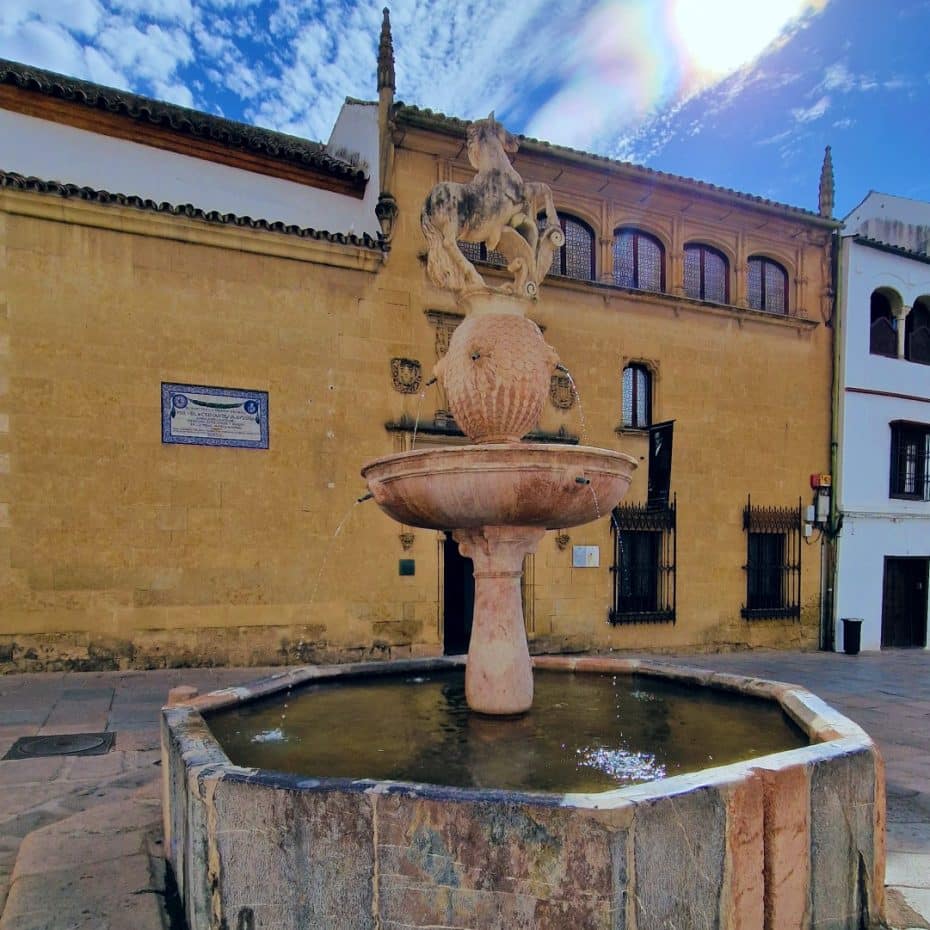
At one end of the square is a 16th-century stone fountain topped by the figure of a rearing colt, with its front legs raised, holding a sign with the city’s coat of arms. This Renaissance-style fountain dates from 1577; a century later, the foal that gives the square its name was added.
The square houses the old Hospital de la Claridad de Nuestro Señor Jesucristo (now Museo de Bellas Artes de Córdoba) and the Julio Romero de Torres Museum. A large number of bars and restaurants with terraces surround it.
21. Madinat al-Zahra Archaeological Site
If you have at least two days in Córdoba, one of the best things to do after seeing the historic city centre is to visit Madinat al-Zahra (Medina Azahara) Archaeological Site.
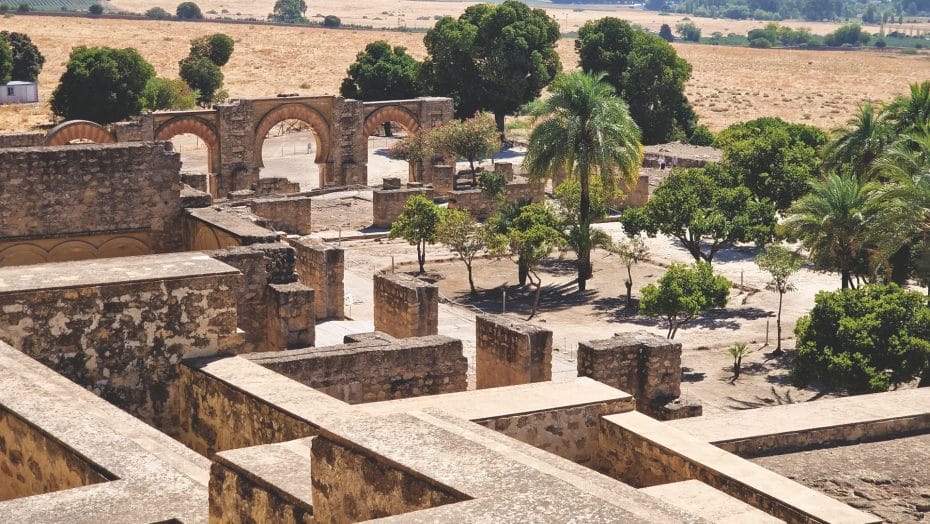
Medina Azahara is an old palace city dating back to 936. It was built at the behest of the Caliph of Córdoba, Abd al-Rahman III, a few kilometres from the current centre of Córdoba.
It is believed that its original size exceeds 100 hectares, but to date, only 10% of it has been excavated and opened to the public.
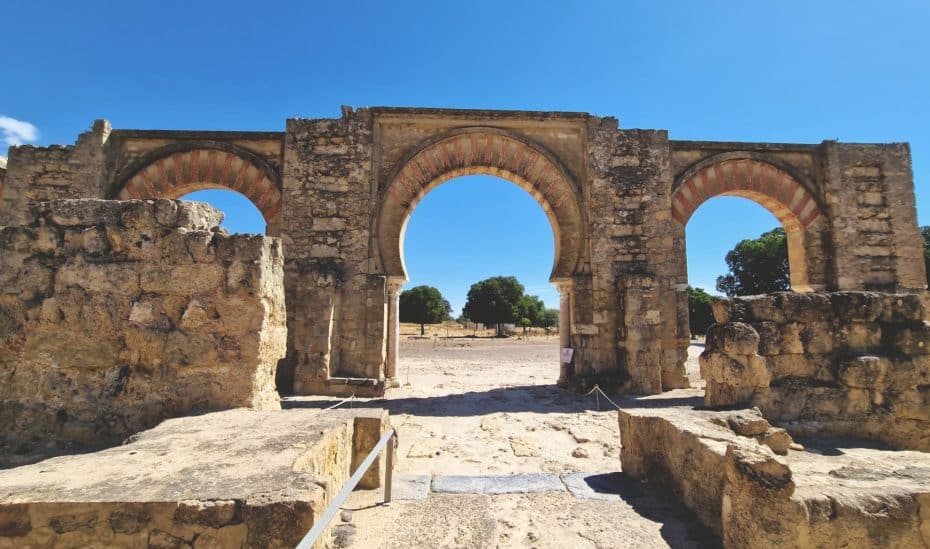
The archaeological site was declared a UNESCO World Heritage Site in 2018.
Medina Azahara was built at the foot of Sierra Morena and is distributed over three superimposed terraces. In one, you can visit the Palace of the Caliph; the central part is home to the administrative buildings and residences of important officials, and the lower part hosts the servants’ quarters.
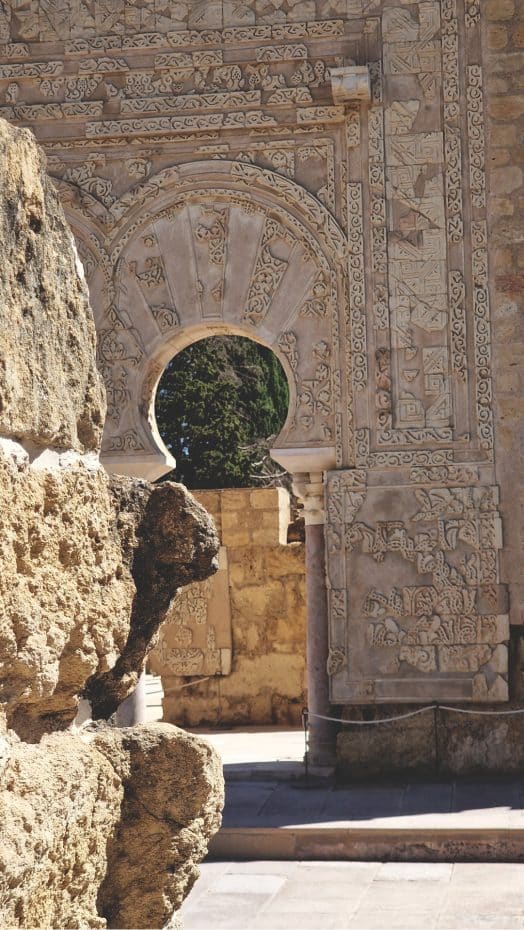
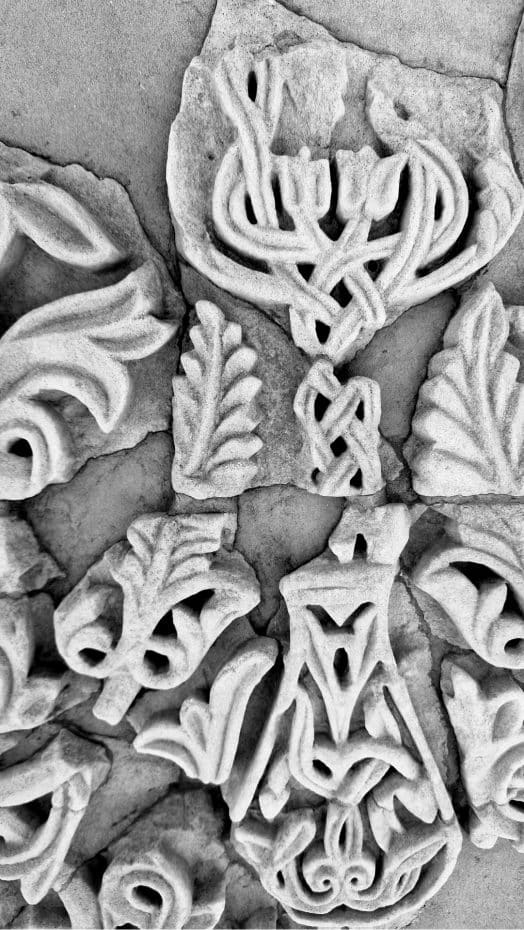
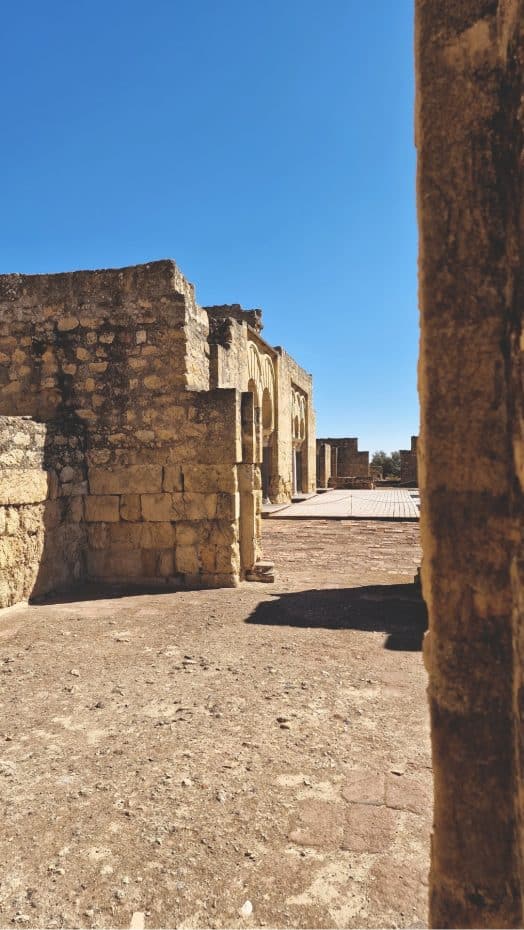
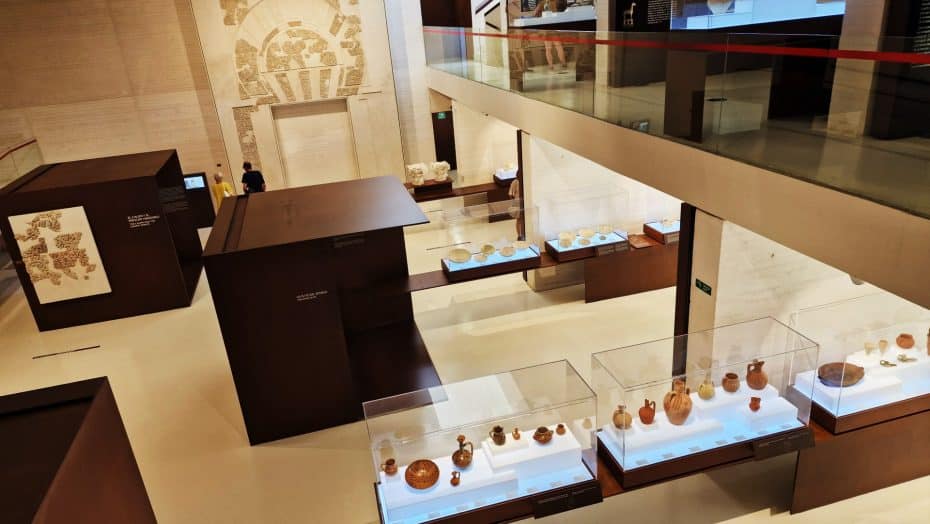
There are many things to see in Medina Azahara, and the visit can take up to 2 hours. To better understand the history and legends that surround this place, it is best to book a guided tour; some include transportation from the city.
Medina Azahara Tours & Activities
Read this post in other languages:
|ES| Qué ver en Córdoba, Andalucía: 21 atracciones que visitar.


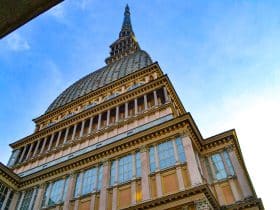
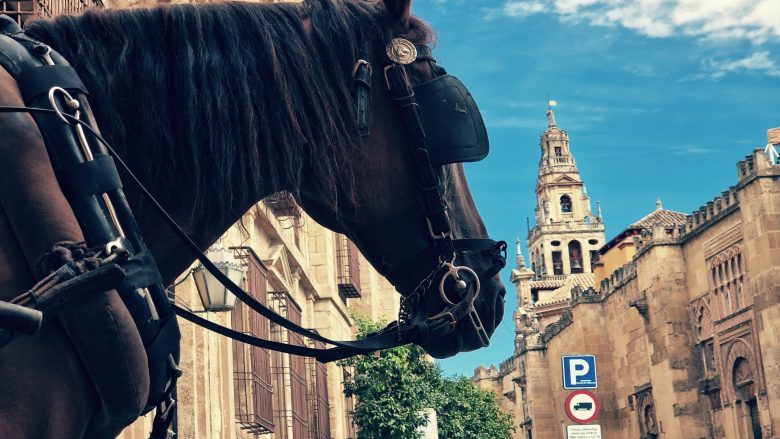
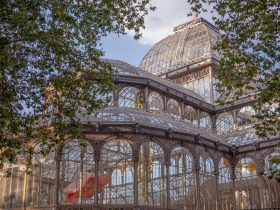
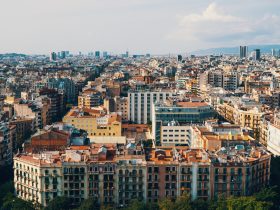
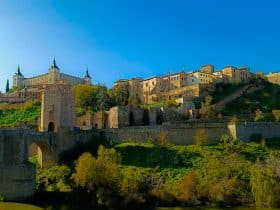
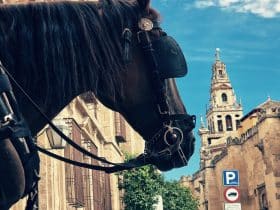

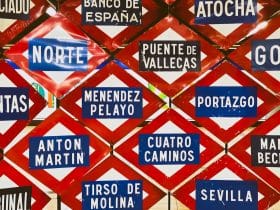
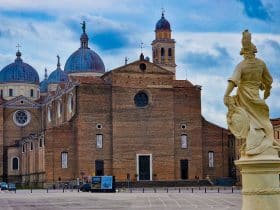

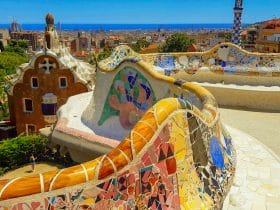
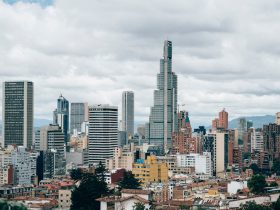
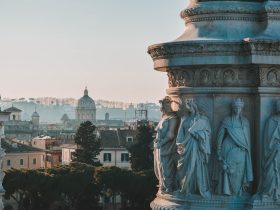
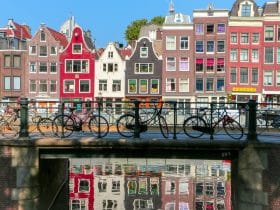
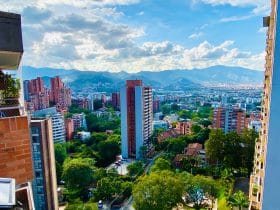
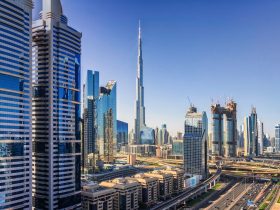
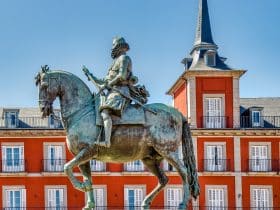
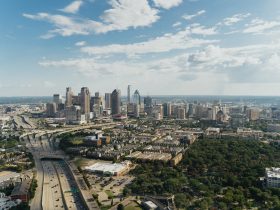
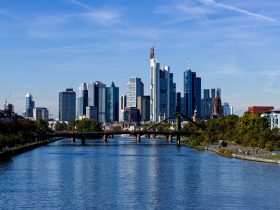
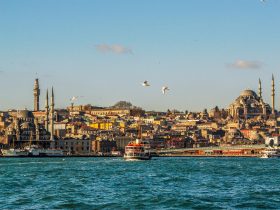
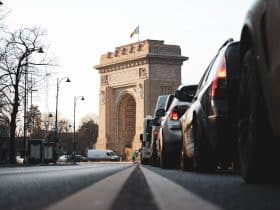

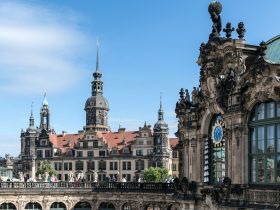
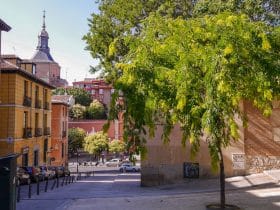
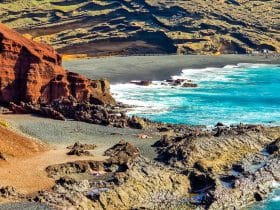
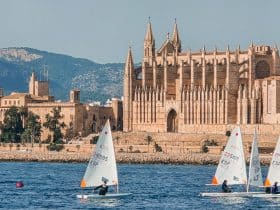
Leave a Reply
View Comments